#how is all of this so fitting for good omens season 2
Explore tagged Tumblr posts
Photo
It's not you I've lost but the world.
(Ingeborg Bachmann - A Kind of Loss)


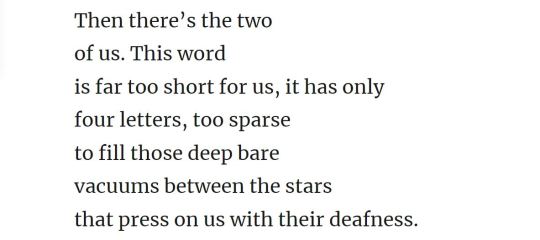


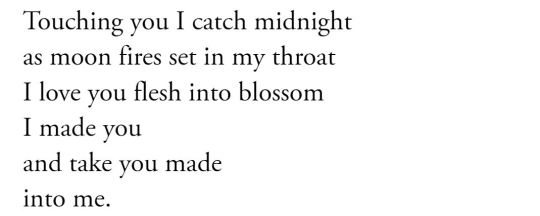




It’s not you I’ve lost, but the world.
a kind of loss (Ingeborg Bachmann), variations on the word love (Margaret Atwood), i am the brother of xx (Fleur Jaeggy), don’t go far off, not even for a day (Pablo Neruda), recreation (Audre Lorde), wuthering heights (Emily Brontë), i carry your heart with me (e. e. cummings)
support my blog
#how is all of this so fitting for good omens season 2#It's not you I've lost but the world#i like making things painful for myself#this show will be the death of me#greatest love story of all time#good omens#aziracrow#ineffable pain#poetry#ingeborg bachmann
3K notes
·
View notes
Text
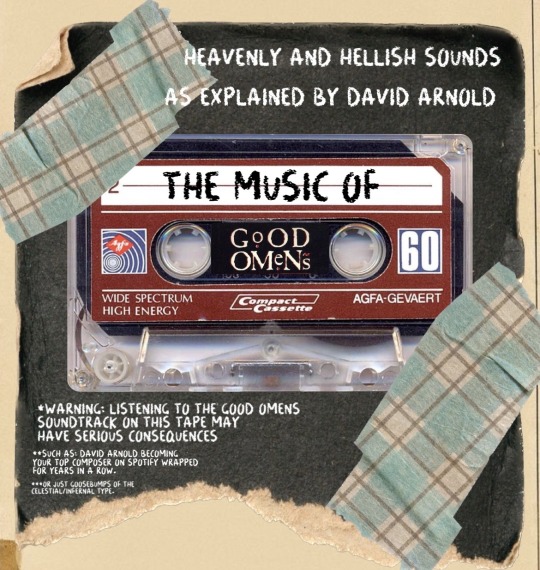
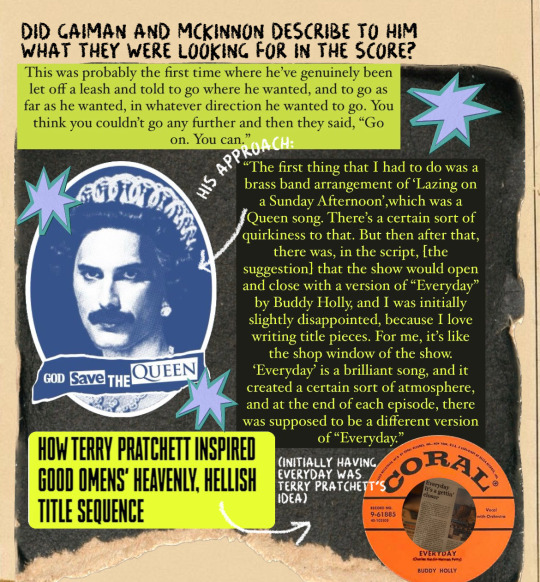
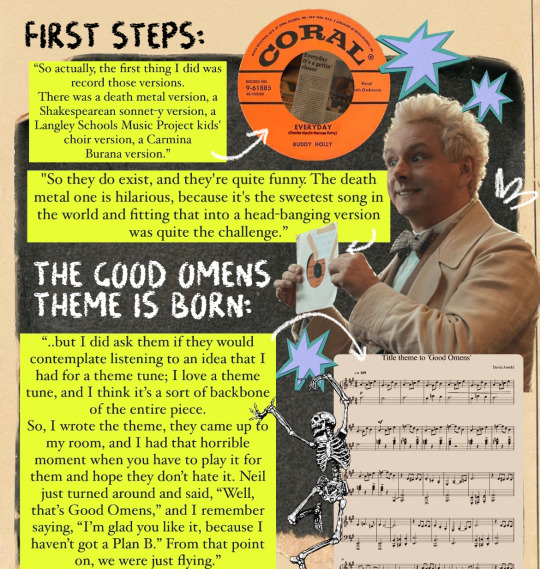
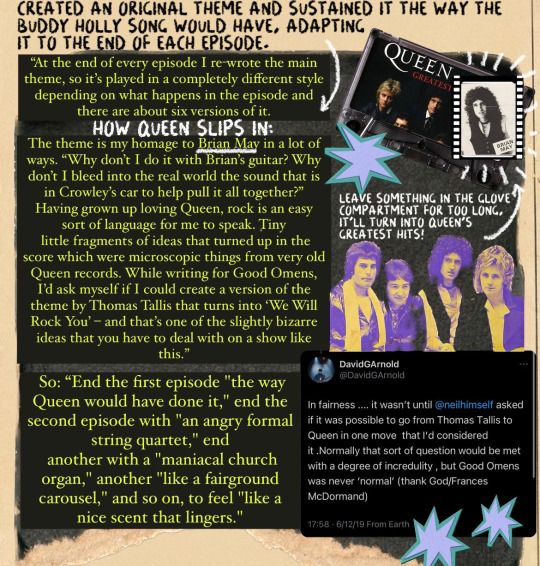
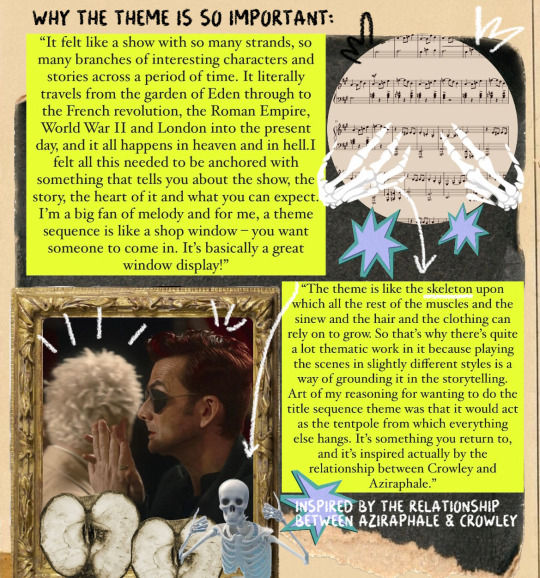
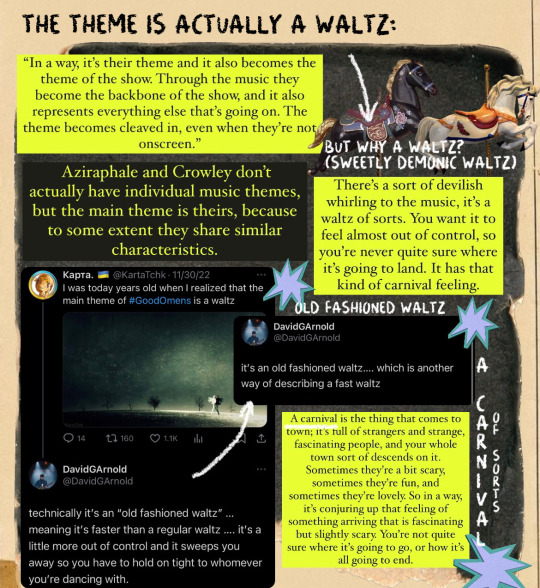
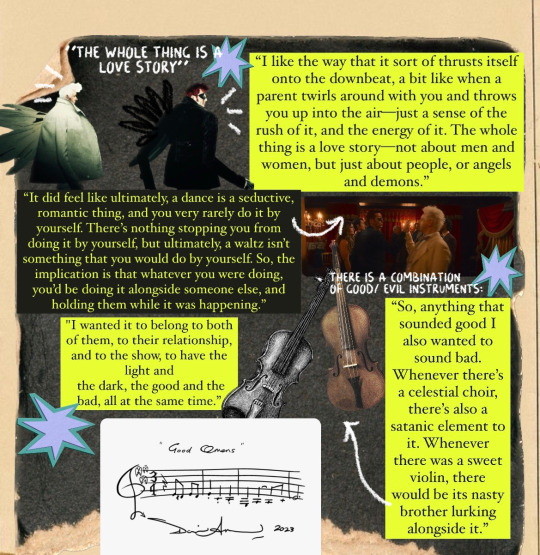
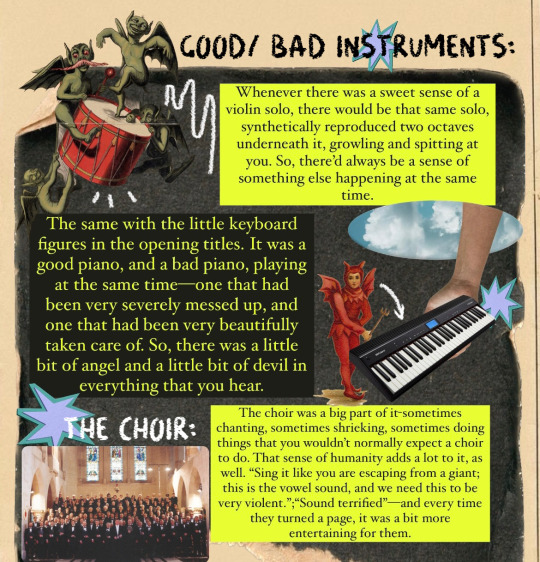
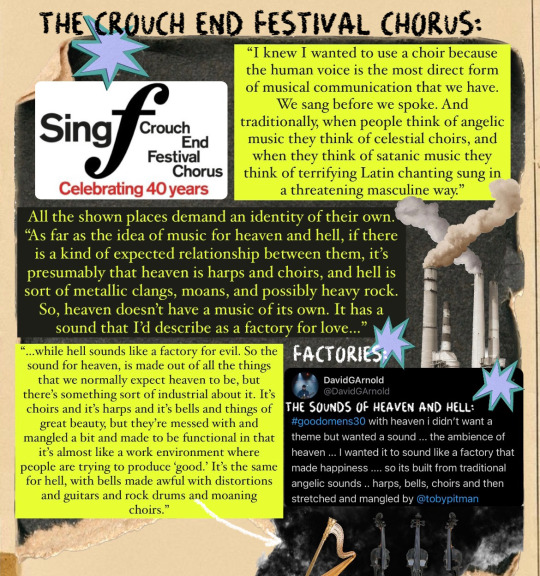
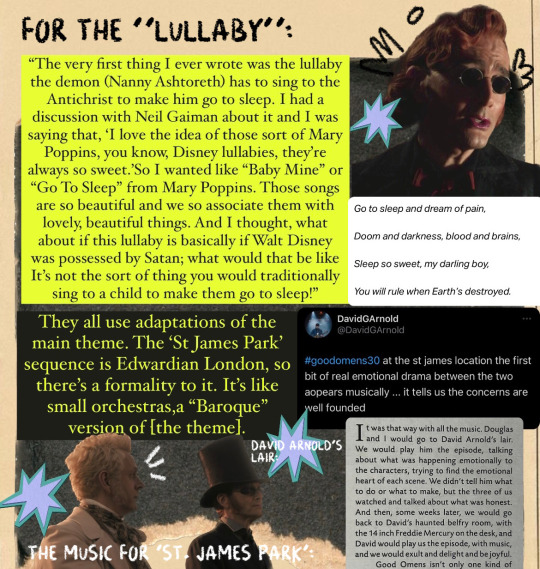
Good Omens: all about its score
I know these have a lot of text, but I tried to put everything in a “chronological, this fits together” order. If you love music, you know how much the score of a certain series/ film adds to the feeling of it.
David Arnold is a genius. There is so much going on beneath the surface. All those little strings you might not pay attention to, they are ATTENTION worthy.
This is part 1. There is a part 2 here!
I also want to point out the one thing I did not add on the slides: there is a moment at the beginning of episode 6 of season 1 where Mark Kermode played the harmonica. (Just as a little cameo for you :) ) In the words of @neil-gaiman “ Ennio Morricone-style Western harmonica music”.
All of the information here was gathered from interviews with David Arnold. (Those include videos as well and the DVD commentaries). I will leave all my sources in part 2.
#good omens#crowley#aziraphale#ineffable husbands#neil gaiman#terry pratchett#good omens fun facts#good omens 2#easter eggs#david arnold#good omens music#good omens soundtrack
2K notes
·
View notes
Text
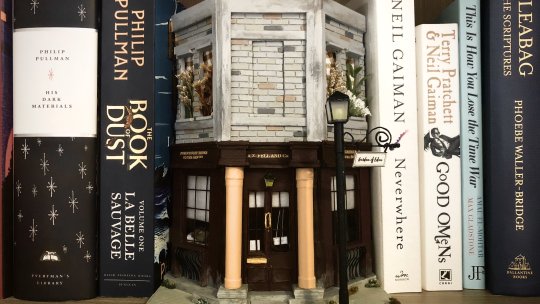
Two years ago during lockdown, I spent my time creating Aziraphale's bookshop using cardboard and various other random materials I had lying around, creating this piece which I could slot into my bookshelf (now it sits next to my growing collection of @neil-gaiman works).
In celebration of Good Omens Season 2, I decided to post pictures of the completed project and the process here! It's my first time posting on tumblr, so forgive me if I'm a bit green.
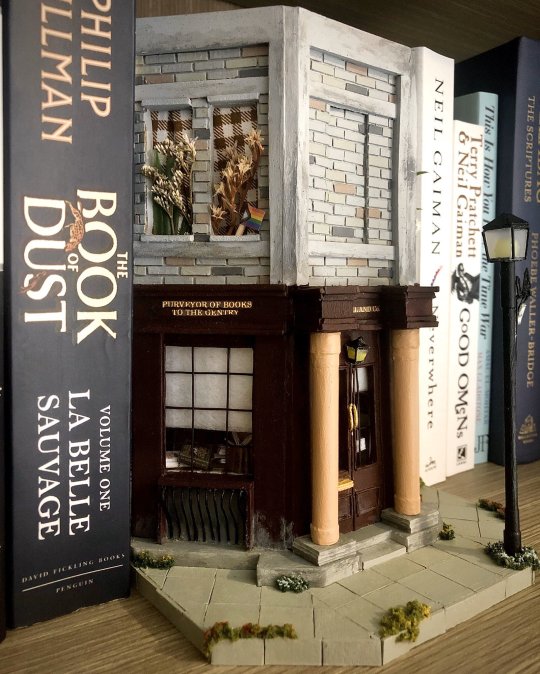
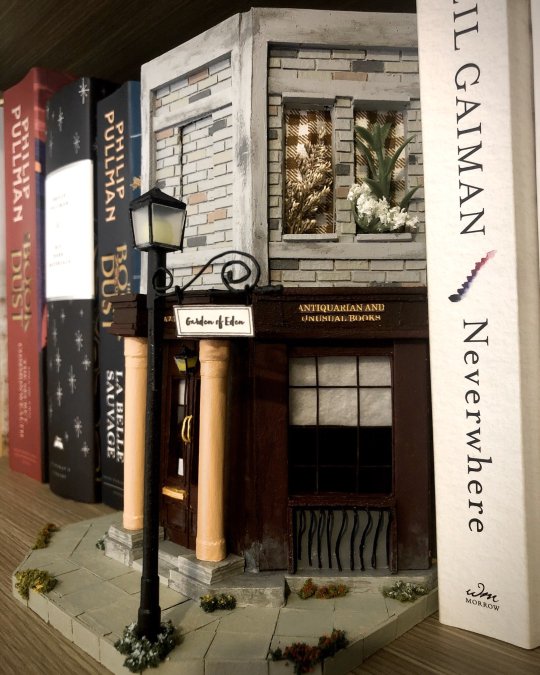
Details and process below!
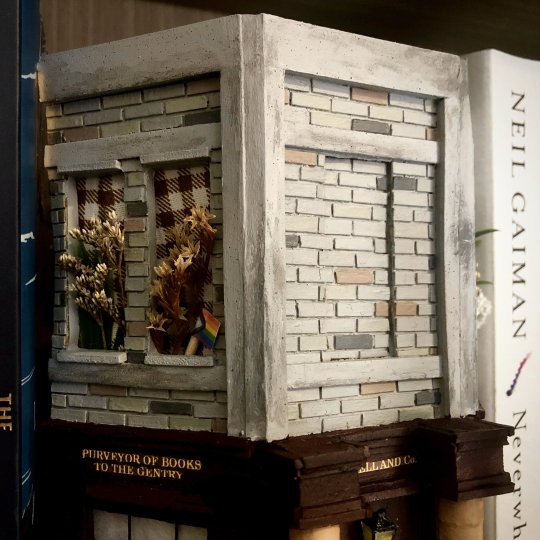
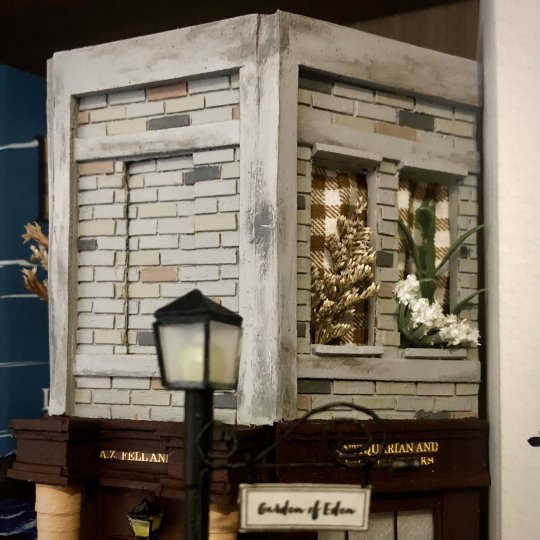
Before we ever got to see what was on the bookshop's upper floor, I imagined a bedroom, perhaps lived-in. Maybe a certain demon had moved in, along with their plants?
The teeny pride flag in the window is one of the subtle ways I sneak in a celebration of pride into my room, away from homophobic prying eyes.
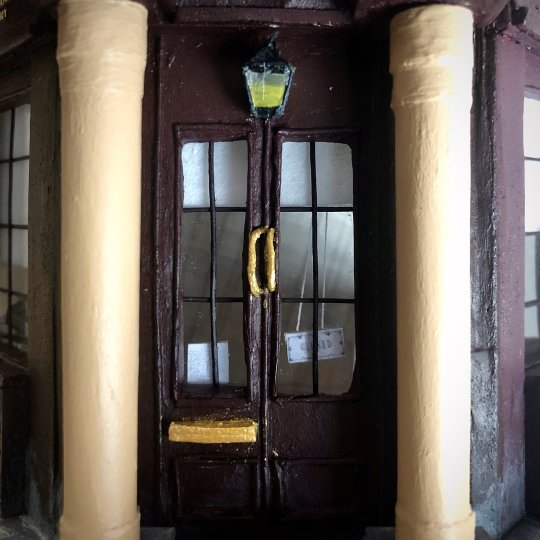
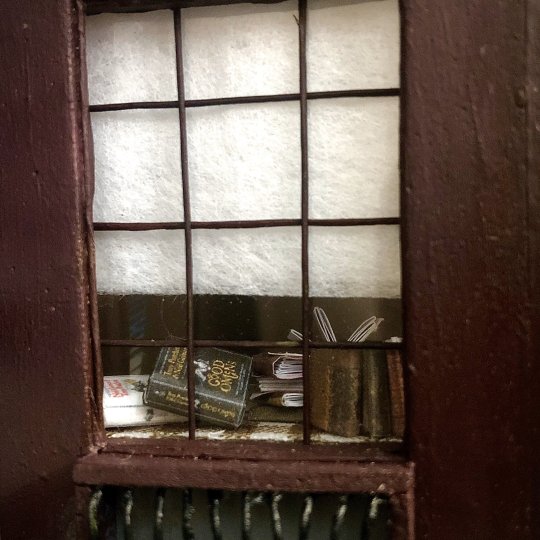
My favourite details! I printed out both signs on Aziraphale's door, the images of which I believe I got from fans that posted them online.
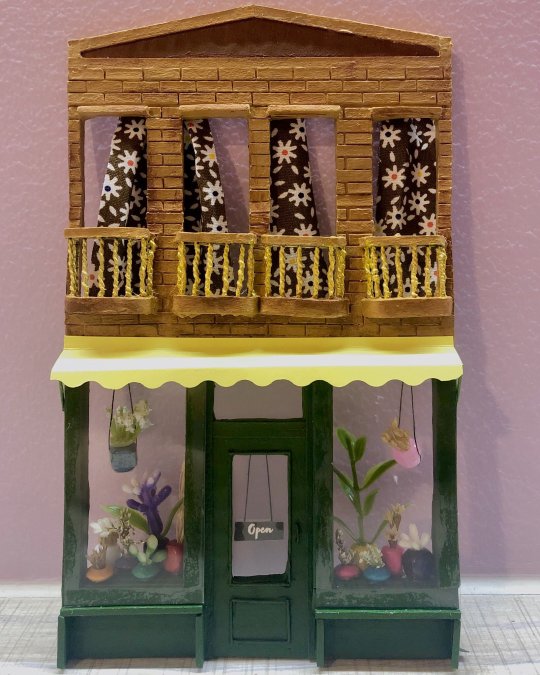
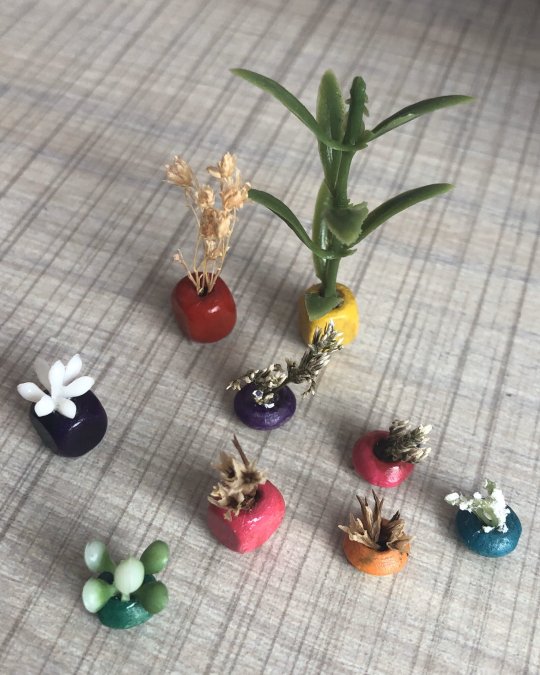
Due to poor planning on my part, I started making this flower shop as well before I knew how it would fit in with the bookshop. In the end, they remained separate pieces. There was even a mini chalkboard sign for the flowershop, which I have no idea where it has disappeared to now.
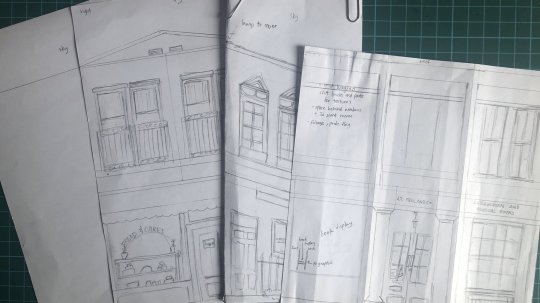
It all started out in August 2020, when I put pencil to paper. Initially I wanted to create a street view, with the bookshop and flower shop on either sides. But honestly my brain was too small to figure out how that worked, so it didn't happen.

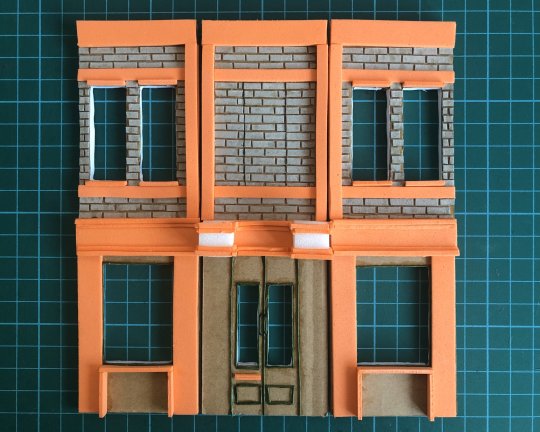
The most fun part was folding the tiny paper books. The least fun? Cutting rectangles out of cardboard and painstakingly gluing them down to resemble bricks.
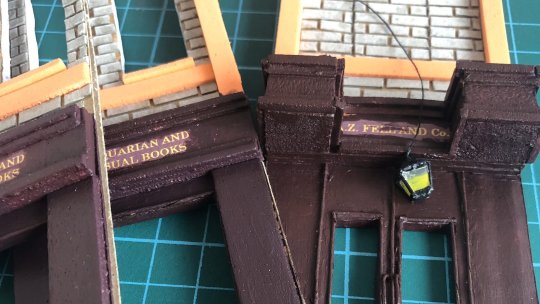
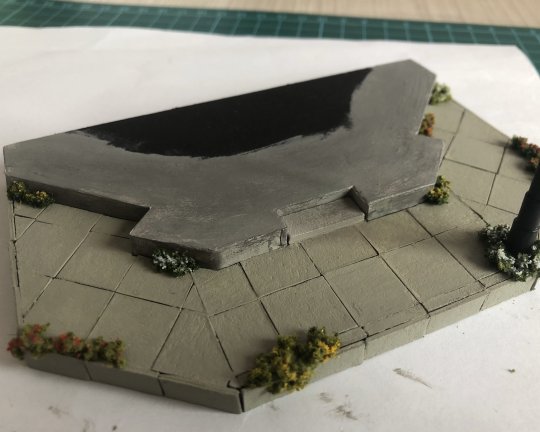
Painting was alright, but on closer examination, the walls were all of different colours due to my inconsistent paint mixing. To ensure that what was essentially a cardboard façade of the bookshop could stand on its own, I created a pavement with added flowering shrubs and a lamp post. The street sign on the lamp post says 'Garden of Eden', which I now know should have been Whickber Street :)
And that's it! I believe I spent ~62 hours working on and off on it, and it certainly kept my lockdown blues at bay.
Can I hear a wahoo?
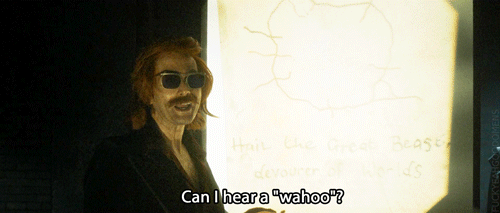
2K notes
·
View notes
Text
Putting the Meta in "Metatron"
(couldn't resist the pun, sorry)
Ok, this has been tickling my brain for a while. I've been thinking about how The Metatron designed his role and discourse specifically to manipulate Aziraphale into the end result we saw in the last minutes of S2. I become obsessed with it because… well, I'm a bit obsessive, but also because there were many really smart writing decisions that I loved (even when I despise The Metatron exactly for the same reasons. Hate the character, love the writer). If you haven't watched Good Omens Season 2, this is the moment to stop reading. Come back later!
We already know that in Book Omens, the role of Gabriel in the ending was occupied by The Metatron. Of course, the series introduced us to Gabriel and we won a lot by that, but I feel that the origins of The Metatron should be considered for any of this. He is not a "sweet old man": he was the one in charge of seeing over the operation of Armageddon; not just a stickler of rules, but the main promoter for it.
However, when he appears in the series finale, we first are primed to almost pass him by. He is in the line for buying coffee, using clothes that are:
obviously not tailored (almost ill fitted)
in dark tones
looking worn and wrinkled
This seems so important to me! All the angels we have seen are so proud of their aspect, wear clear (white or off white) clothes, pressed, impeccable (even Muriel), even when they visit the Earth (which we have already seen on S1 with all the visits to the bookshop). The Metatron chose a worn, comfortable attire, instead. This is a humanized look, something that fools all the angels but which would warm up someone very specific, can you guess?
After making quite a complicated coffee order (with sort of an affable and nervous energy), he makes a question that Crowley had already primed for us when asking Nina about the name of the coffee: having a "predictable" alternative and an unpredictable one.
This creates an interesting parallel with the next scene: Michael is discussing the possibility of erasing Aziraphale from The Book of Life (a punishment even worse than Holy Water on demons, because not having existed at all, EVER is definitely worse than having existed and ceased to exist at some point) when The Metatron arrives, interrupts the moment and signals having brought coffee. Yup, an amicable gesture, but also a "not death" offering that he shows clearly to everyone (even when Michael or Uriel do not understand or care for it. It wasn't meant for them). He even dismisses what Michael was saying as "utter balderdash" and a "complete piffle", which are the kind of outdated terms we have heard Aziraphale use commonly. So, The Metatron has put up this show for a specific audience of one.
The next moment on the script has Metatron asking Crowley for the clarification of his identity. Up to this moment, every angel has been ignoring the sprawled demon in the corner while discussing how to punish Aziraphale… But The Metatron defers to the most unlikely person in the room, and the only one who will push any buttons on Aziraphale: Crowley. After that, Aziraphale can recognize him, and Metatron dismisses the "bad angels" (using Aziraphale's S1 epithet) with another "catchy old phrase", "spit spot", while keeping Muriel at the back and implying that there is a possibility to "check after" if those "bad angels" have done anything wrong.
Up to this moment, he has played it perfectly. The only moment when he loses it is when he calls Muriel "the dim one", which she ignores… probably because that's the usual way they get talked to in Heaven. I'm not sure if Aziraphale or Crowley cared for that small interaction, but it is there for us (the audience) to notice it: the sympathy the character might elicit is built and sought, but he is not that nice.
After that, comes "the chinwag" and the offer of the coffee: the unnecessarily complicated order. It is not Aziraphale's cup of tea (literally), but it is so specific that it creates some semblance of being thought with care, and has a "hefty jigger" of syrup (again with the funny old words). And, as Aziraphale recognizes, it is "very nice!" (as The Metatron "jolly hoped so"), and The Metatron approves of him drinking it by admitting he has "ingested things in my time, you know?". This interaction is absolutely designed to build a bridge of understanding. The Metatron probably knew that the first response he would get was a "no", so he tailored his connection specifically to "mirror" Aziraphale: love of tasty human treats he has also consumed, funny old words like the ones he loves, a very human, worn, well-loved look. That was the bait for "the stroll": the moment when Aziraphale and Crowley get separated, because The Metatron knew that being close to Crowley, Aziraphale would have an hypervigilant soundboard to check the sense of what he was going to get offered. That's what the nasty look The Metatron gives to Crowley while leaving the bookshop builds (and it gets pinpointed by the music, if you were about to miss it).
The next thing we listen from The Metatron is "You don't have to answer immediately, take all the time you need" in such a friendly manner… we can see Aziraphale doubting a little, and then comes the suggestion: "go and tell your friend the good news!". This sounds like encouragement, but is "the reel". He already knows how Crowley would react, and is expecting it (we can infer it by his final reaction after going back for Aziraphale after the break up, but let's not get ahead of ourselves shall we?). He even can work up Muriel to take care of the bookshop while waiting for the catch.
What did he planted in Aziraphale's mind? Well, let's listen to the story he has to tell:
"I don't think he's as bad a fellow… I might have misjudged him!" — not strange in Aziraphale to have such a generous spirit while judging people. He's in a… partnership? relationship? somethingship? with a demon! So maybe first impressions aren't that reliable anyway. The Metatron made an excellent job with this, too.
"Michael was not the obvious candidate, it was me!" — This idea is interesting. Michael has been the stickler, the rule follower, even the snitch. They have been rewarded and recognized by that. Putting Aziraphale before Michael in the line of succession is a way of recognizing not only him, but his system of values, which has always been at odds with the main archangels (even when it was never an open fight).
"Leader, honest, don't tell people what they want to hear" — All these are generic compliments. The Metatron hasn't been that aware of Aziraphale, but are in line with what would have been said of any "rebel leader". They come into context with the next phrase.
"That's why Gabriel came to you, I imagine…" — I'm pretty sure The Metatron didn't imagine this, ha. He is probably imagining that the "institutional problem" is coalescing behind his back, and trying to keep friends close, but enemies closer… while dividing and conquering. If Gabriel rebelled, and then went searching for Aziraphale (and Crowley, they are and item and he knows it), that might mean a true risk for his status quo and future plans.
Heaven has great plans and important projects for you — this is to sweeten the pot: the hefty jigger of almond syrup. You will be able to make changes! You can make a difference from the inside! Working for an old man who feels strangely familiar! And who recognizes your point of view! That sounds like the best job offer of the world, really.
Those, however, are not the main messages (they are still building good will with Aziraphale); they are thought out to build the last, and more important one:
Heaven is well aware of your "de facto partnership" with Crowley…
It would be considered irregular if you wanted to work with him again…
You, and you alone, can bring him to Heaven and restore his full angelic status, so you could keep working together (in very important projects).
Here is the catch. He brought the coffee so he could "offer him coffee", but the implications are quite clear: if you want to continue having a partnership with Crowley, you two must come to Heaven. Anything else would be considered irregular, put them in a worst risk, and maybe, just maybe, make them "institutional enemies". Heaven is more efficient chasing enemies, and they have The Book of Life as a menace.
We already know how scared Aziraphale has always been about upsetting Heaven, but he has learned to "disconnect" from it through the usual "they don't notice". The Metatron came to tell him "I did notice, and it has come back to bite you". The implied counterpart to the offer is "you can always get death". Or even worse, nonexistence (we have already imagined the angst of having one of them condemned to that fate, haven't we?)
When The Metatron arrives, just after seeing Crowley leave the bookshop, distraught, he casually asks "How did he take it?", but he already knows. That was his plan all along: making them break up with an offer Aziraphale could not refuse, but Crowley could not accept. That's why he even takes the license to slightly badmouth Crowley: "Always did want to go his own way, always asking damn fool questions, too". He also arrive with the solution to the only objection Aziraphale would have: Muriel, the happy innocent angel that he received with so much warmth and kindness, is given the opportunity to stay on Earth, taking care of the bookshop. The only thing he would have liked to take with him is not a thing, and has become impossible.
If God is playing poker in a dark room and always smiling, The Metatron is playing chess, and he is quite good at it (that's why he loves everything to be predictable). He is menacing our pieces, and broke our hearts in the process… But I'm pretty sure he is underestimating his opponents. His awful remark of Muriel being "dim"; saying that Crowley "asks damn fool questions", and even believing that Aziraphale is just a softie that can be played like a pipe… That's why telling him the project is "The Second Coming" was an absolute gift for us as an audience, and it prefigures the downfall that is coming — the one Aziraphale, now with nothing to lose, started cooking in his head during that elevator ride (those couple of minutes that Michael Sheen gifted to all of us: the shock, the pain, the fury, and that grin in the end, with the eyes in a completely different emotion). Remember that Aziraphale is intelligent, but also fierce. Guildernstern commited a similar mistake in Hamlet, and it didn't go well:
"Why, look you now, how unworthy a thing you make of me! You would play upon me, you would seem to know my stops, you would pluck out the heart of my mystery, you would sound me from my lowest note to the top of my compass, and there is much music, excellent voice, in this little organ, yet cannot you make it speak. 'Sblood, do you think I am easier to be played on than a pipe? Call me what instrument you will, though you can fret me, you cannot play upon me."
I'm so excited to learn how this is going to unfold!! Because our heroes have always been very enthusiastic at creating plans together, failed miserably at executing them, and even then succeeding… But now they are apart, more frustrated and the stakes are even higher. Excellent scenario for a third act!
*exits, pursued by a bear*
#good omens#good omens 2#good omens meta#good omens spoilers#aziraphale#ineffable spouses#ineffable divorce#narrative analysis#character analysis#the metatron#and a casual Hamlet quote#just because I love Hamlet
2K notes
·
View notes
Text
Jimbriel, Satan, the Book of Life, and what it means for Crowley
Acknowledging that what we know so far about the Book of Life from various characters is highly suspect, I'm going to posit to you that Beelzebub is actually the true authority on the Book of Life, and that they bookend Season 2 with very important (and hopefully accurate) information about the Book of Life. With that in mind, let's take Beezlebub's S2E1 description and see how it fits with other canon evidence:

But what does it mean to have never existed in the Good Omens universe? For that, let us look to Satan.
From in-show canon, we know that Adam was able to retroactively change Satan's status as his father to not his father:
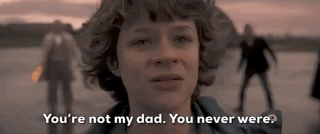
Adam altered reality, although Crowley, Aziraphale, the other celestials, and even Adam himself remember those events from a timeline that supposedly has been erased:

But Crowley nonetheless confirms that this is reality now. Satan was never Adam's father.
Additionally, though not technically in-show canon, we know from Notorious NRG that once Satan became Lucifer, this erased Lucifer from existence in the GO universe:
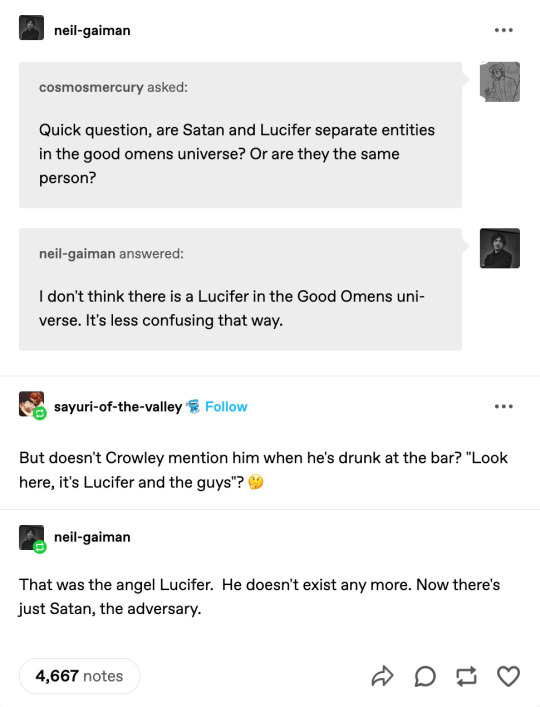
And Crowley's monologue in the bar drives it home; even though Lucifer no longer exists, Crowley still remembers him, and some key events that they were involved in together.
But a more dramatic portrayal of erasure is found in our favorite Good Omens himbo, Jimbo. In the trial of Gabriel, the Metatron makes direct allusion to the fact that Gabriel will no longer be Gabriel after his demotion:

Not "your memory of your time as the supreme archangel will be erased," no, it's:
Your memory of your time as Gabriel will be erased.
Whether he means to or not, Aziraphale reinforces this characterization of memory-loss-as-new-identity:
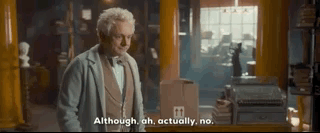
This can be taken simply as a safety measure, but Jimbo doesn't understand it that way and we see throughout the remainder of the season that Aziraphale is very consistent about calling his unexpected guest "Jim," even correcting Crowley when they're speaking privately and it wouldn't blow his cover to call him Gabriel:

But the final word on memory and identity, especially as they pertain to Jimbriel, again comes from our Lord of the Flies, Beelzebub:

All your you is your memories.
Altogether we see that there is significant in-show canon to support a theory that memory is inextricably linked with identity, and that when memory is removed, identity is so drastically changed that the name of the entity must also change... and the person who existed before, with that former name, exists no longer; it is as if they never had.
(But, as we see in the case of Gabriel, they can be restored.)
I told you in the title that this post was about the Book of Life: it is. Everything discussed here about memory and identity must necessarily characterize how the Book of Life operates, at least with respect to erasure. When someone is erased, they don't vanish, but they are so changed it is as if a new person has taken the place of the old, the way Jim took the place of Gabriel, until he got his memories back. But we can surmise that when someone is erased from the Book of Life, their memories aren't conveniently stored in a TARDIS/Ru Paul fly for later recovery. The memories may not be gone, but I'm going to guess that they would be extremely difficult (or impossible) to retrieve.
What this means for Crowley:

I think we need to give this scene a lot more credit for telling us how this universe works. Surface level, it reads as "you don't understand my trauma, and how I've been changed by it." Which is a very valid interpretation. But we can dig deeper and see that, given everything else we know about celestial beings losing their memories, names, and identities, Crowley is alluding to something far more horrific than just the scars left by flaming swords and halo-grenades.
These are the scars of a lobotomy. Something was taken from him, and he is aware of it.
He knows that his memory has been tampered with. Various people (Furfur, Saraqael) tell him that they recognize him, and of things they've done together. He has no recollection of them, but instead of getting agitated, he brushes it off and ignores it. This lack of questions from the guy who questions everything tells us that he already has the answers; not the memories, but the knowledge of why he doesn't have them.
Furthermore, when he's trying to get Jim to remember the something bad and Jim says it hurts, Crowley says:

I know. Do it anyway.
How does Crowley know that it hurts, to try to recall memories that have been taken out of your head?
Because he's been through it.
He has tried to remember, and some memories, like working on the Horsehead Nebula with Saraqael or monkeying around with Furfur, weren't worth the pain. Or perhaps it was pain on top of pain to remember what he had lost.
It is an especial testament to the cruelty of Heaven that he remembers going into battle, but not the bonds he formed with his friends. He remembers a million lightyear freestyle dive into a boiling pool of sulfur, but not the work he did on the Horsehead Nebula, a thing that brought him joy.
And now, the person he loves most in the world, his only refuge from the terror of his empty nightmares, from his malignant and creeping sense of unease that something is missing, has gone back to that place where his identity was so horribly violated that he lost his name.
How will our hero cope?
If you liked this meta, you will almost certainly like my meta on Continuity Errors.
For my thoughts on who Crowley may have been before the fall, go here.
For my thoughts on how this pertains to Metatron, go here.
As I continue to produce metas related to this theory, you'll be able to find them all here.
#good omens#good omens 2#book of life#good omens meta#aziraphale#crowley#gabriel#ineffable husbands#ineffable bureaucracy#beelzebub#ivoc#erasure theory
947 notes
·
View notes
Text
What the fuck is Jesus up to in Good Omens season 3?
This is a question I've been thinking long and hard these past couple of days and I have some THOUGHTS SO. Buckle up.
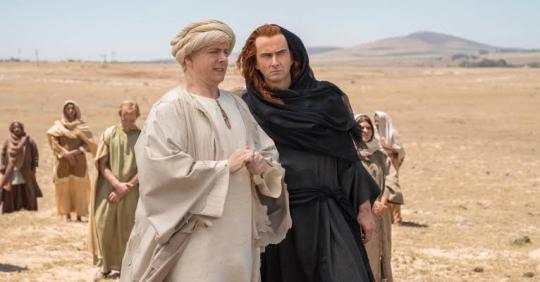
Aziraphale and Crowley watching the Crucifixion (Good Omens, 2019)
First off. The answer to the question posited is relatively simple. What is Jesus up to in GO3? With s2's ending in mind and with the hints we've gotten for 668: Neighbor of the Beast over the years, we know he's descending to Earth to initiate the Second Coming. And that Aziraphale would probably make that happen - or do everything that he can as Supreme Archangel to sabotage it.
But I wanted to examine on how Jesus might fit into Good Omens' overall narratives and established themes - about morality and humanism and free will, and. I'm just saying, there are A LOT of fascinating routes they could do for his character.
(Disclaimer as usual: this is a theory that I obsessed over when I was stuck at the cemetery during All Souls' Day and must be treated as such. In no way am I insisting this should be how canon events must happen. I am just doing this for the funsies.)
The THING about Jesus if you situate him in the world of Good Omens (with the assumption that most of the pop culture Christology mythos associated with him remain intact) is that in this context he very quickly becomes: 1. Adam Young's narrative foil; and 2. an Aziraphale parallel.
Now, the first one is obvious. Of COURSE he is Adam Young's foil, duh. Adam isn't called the ANTICHRIST for nothing. Brought into the world just for the sole purpose of ending it. However, when the time comes for him to fulfill the Will of his Satanic Father, Adam flat out REFUSES.
Both the book and the show attribute this to Adam's human upbringing. He was raised as a human, and because of that he has the trait that the book uses to DEFINE human beings: free will. At the end, Adam had the AGENCY to reject the destiny planned out for him.
'Adam stood smiling at the two of them, a small figure perfectly poised exactly between Heaven and Hell.
Crowley grabbed Aziraphale's arm. "You know what happened?" he hissed excitedly. "He was left alone! He grew up human! He's not Evil Incarnate or Good Incarnate, he's just… a human incarnate—"'
- (Good Omens, 1990)
That is NOT what happened to Jesus.
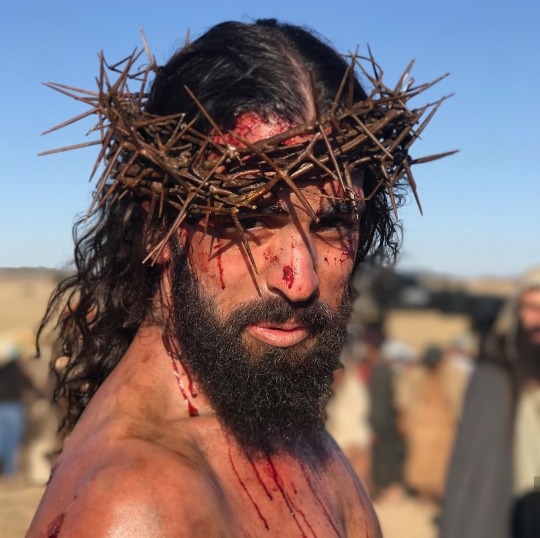
Adam Bond as Jesus in Good Omens (2019)
Like Adam, he was raised as a human -- being a human incarnate was his WHOLE DEAL in Christology. In the beginning was the Word, and the Word was made flesh and dwelt among us... yada yada yada.
UNLIKE, Adam, though, Jesus wasn't able to REJECT his Destiny of Dying Really Horribly and Painfully on the Cross. Narratives in the Bible also made it clear that the Crucifixion was NOT his Will, but that of God's. Like... him begging to be spared from torment but ultimately following God's Will is such an important event entire devotional practices are made out of it.
"39 And he went a little farther, and fell on his face, and prayed, saying, O my Father, if it be possible, let this cup pass from me: nevertheless not as I will, but as thou wilt."
- (Matthew 26: 39, KJV)
We get a glimpse of that in s1ep3 of Good Omens, too:
"JESUS
(muttering through the pain)
Father, please . . . you have to forgive them . . . they don’t know what they are doing . . .
Crowley, in black, comes up next to Aziraphale.
CROWLEY
You’ve come to smirk at the poor bugger, have you?
AZIRAPHALE
Smirk? Me?
CROWLEY
Well, your lot put him on there.
AZIRAPHALE
I am not consulted on policy decisions, Crawley."
- (The Quite Nice and Fairly Accurate Good Omens Script Book, 2018)
SO. Here we have the character of the Christ whose free will and agency had been STRIPPED from him in the guise of a "noble sacrifice." He comes back again on this Earth to fulfill another "inescapable destiny."
Aziraphale and Crowley need to stop him. The solution the Good Omens narrative offers to "inescapable destinies and systems" (both in s1 and s2) is for the character to realize they have the freedom to choose their own fates. It happened with Adam, and it happened with Gabriel, and perhaps it will happen to Jesus.
(At this point my sister frowned and said: "Are you telling me you think Aziraphale and Crowley are going to help Jesus realize he has agency and that him Dying on the Cross for the 'Great Plan' was kinda fucked up actually?" which sounds crazy when you put it like that BUT NEVER SAY NEVER BABIE.)
Because that brings me to my second point: if this all happens, Jesus becomes an AZIRAPHALE parallel.
In the same way Anathema is an Aziraphale parallel and Sergeant Shadwell is an Aziraphale parallel. Here is a character stuck in a suffocating status quo. To save the world, he needs to know he can escape that status quo and decide for himself. In the same way Anathema has to learn how to stop being a descendant or Shadwell to stop being a Witchfinder, or Gabriel to stop being an Archangel, and Adam to stop being an Antichrist, perhaps Jesus has to learn he can stop being... Well, the Christ, as well.
And this, of course, supplements Aziraphale's journey of letting go of the idea of being an idealized vessel of God, so he could finally enjoy the freedom of personhood and choice on Earth, with Crowley.
Or they could turn Jesus into a cackling villain who Aziraphale and Crowley need to kill in season 3, and I'd probably eat that up, too.
#good omens#good omens meta#good omens 2#good omens season 2#good omens spoilers#ineffable husbands#aziracrow#this was such an insane meta post to make but i had to do it#putting my religious trauma to good use iktr#enna rambles
589 notes
·
View notes
Text
on switching places

So I’m sure you have noticed that during the whole end of episode 6 there is this beautiful bright light coming in the bookshop windows. From the east. Because it’s morning.
(Even if we didn’t know what time of day it was, we know what direction the light is coming from, because these windows are right above Aziraphale’s desk, which faces east.)
And after Crowley leaves the bookshop, he goes across the street, and Aziraphale keeps glancing toward the door and window, looking over at Crowley, hoping he’ll come back. (He always comes back.) The blocking in the scene with the Metatron, the one where Aziraphale almost decides to stay, is set up so that he’s looking the wrong way, toward the windows on his right instead of to his left, where Crowley should be. (And, when he seems closest to saying no, he steps back, right to the edge of that beam of light that almost seems like it’s from Crowley.) And we know that their blocking stays reversed (Crowley screen left, Aziraphale screen right) for the rest of the episode.
But also, Aziraphale is looking east. To what is normally his position, as guardian of the eastern gate.
Which got me thinking. What if they have switched places? Not literally in a bodyswap sense, but metaphorically in terms of their relationship to humanity.
They’re the serpent and the sword, right? Those Biblical symbols are already subverted in the story of Good Omens. The sword is something given to humans for their protection, not something meant to be used against them, to keep them out of paradise. (And in the world of Good Omens, leaving Eden looks a whole lot like escaping.) And the apple is framed as a positive symbol too. It’s knowledge, questions asked and answered, the ability to make your own choices. It’s freedom.
So what if they’ve switched roles, and by the end of season 2 Crowley has taken up Aziraphale’s position as the protector of humanity (as we saw him do with individual humans many times this season). We all know Crowley won’t actually be able to abandon humanity and the Earth when the chips are down. I think it’s highly likely that some part of season 3 will feature Crowley on the side of humanity against Heaven, probably in what he considers at that point to be a suicide mission, but he can’t just walk away.
And then what if, in season 3, we see Aziraphale take up whatever the equivalent of Crowley’s position would be in that plotline, as the character who grants freedom and choice to humanity in some way. (By freeing Earth from Heaven and Hell’s power? By figuring out how to give humans the choice to interact with angels and demons only if they want to? I don’t know exactly how this would play out, but it’s a fascinating idea to poke at.)
Of course I think they will ultimately end up working together and whatever happens will require their combined power, but I think it would be amazing if we saw this kind of role reversal. And it would fit with their character arcs: Crowley being the one who is ready to stand and fight even when it looks hopeless, and Aziraphale being the one who gives humanity the power to question, challenge and disobey Heaven.
Protection and freedom—those are their gifts to humanity. (The Bible might call it temptation, but there never was an apple that wasn’t worth the trouble you got into for eating it.) And it turns out that those are the exact same things Aziraphale and Crowley need for themselves. You can’t have one without the other. “Protection” without freedom is just control, and freedom without the ability to defend itself gets crushed by the forces that don’t want it to exist. And so their fates are tied to humanity, as they were from the beginning. And maybe humanity will be able to give them the same gifts in return.
#good omens#good omens s2#aziraphale#crowley#the serpent and the sword#the bible is a revisionist history of the events of good omens#yeah time to bring that tag back around
625 notes
·
View notes
Text
GUYS. GUYS. It's gonna be okay. Just think of it this way because I saw @tastywormfood talking about this and it lowkey comforted me just a tiny bit.
Season 4 is a prequel, okay? It's the badly written season that they tried to fit in between s2 and 3 but did a terrible job. S3 is the actual finale where we get the yummy Snufmin angst and fluff and an amazing ending. So here's a lil comfort checklist that'll for sure cheer us all up after the long disastrous few days we've suffered through.
1. Take a nice long breath of Moominvalley air and say some positive affirmations.
-"S4 is a prequel"
-"Snufmin is the original meant-to-be"
-"I will survive this. Probably"
-"S3 will save me"
-"So will fanfiction"
2. Rewatch S3 and bask in the warmth that is Snufmin fluff and pining. Specifically, watch episode 8. Near the end. 18:36. Don't judge me.
3. Go to AO3 and pray to the Hobgoblin that it isn't shut down for once. If the Hobgoblin answers your prayers, go read every Snufmin fic you can get your paws on. I promise you'll feel better ;)
4. Let's all go pay @faygosta on YouTube a visit and blow up his notifications on his old Snufmin 3d video. Gotta get this guy to save our lives and help us create the better season that was always meant to be, am I right? Plus, his video alone could do a great deal of cheering up. Trust me.
5. Art is a great healing method and Pinterest is a great place to start your Snufmin art therapy sessions. God knows how much we need them after this.
6. Keep up hope that there's actually gonna be a finale episode in the coming months that I've been hearing snippets about. Maybe we'll get a little more mercy and kindness from the writers then after they've had a chance to simmer in the heat of the crockpot mess of a fandom they've created.
Good lord I have never been so disappointed in my life. We got queerbaited like no fandom has ever been before(unless the newly shortened Good Omens season has anything to say about it). But we are a strong fandom, a united fandom, one that cares about justice and freedom for their gay lil bois. Can I get an AMEN?! We'll get through this somehow!
#snufmin#moomintroll#moominvalley#snufkin#kinda disappointed#kinda is an understatement#okay im gonna say it#fuck s4 and all its queerbaiting bullshit#we deserve better#justice for snufmin#im going to bed#it's been a long day of yelling at talking marshmallows#and about the absence of the lil green guy with a funky hat#peace out
77 notes
·
View notes
Text
Good Omens: on fate and reality
In season 1 of Good Omens, The Nice and Accurate Prophecies of Agnes Nutter, Witch play a vital role in helping to avert the Apocalypse. Anathema dedicated her life to understanding Agnes's prophecies and thereby helping to fulfill them. But in the final episode of season 1, when the package with the follow-up collection of prophecies arrives, she decides to burn them, because she does no longer want to live her life according to the writings of her ancestor.

This is interpreted by many as Anathema taking her fate in her own hands instead of subjugating herself to something that was foretold. But the fact that she burns the prophecies instead of studying them does not necessarily mean that she changed her fate. It is entirely possible that her life will still take the road that Agnes foresaw for her. Agnes probably even predicted the burning of the new prophecies.
The only difference is that now, Anathema knows that all the decisions she makes are of her own free will, while otherwise she would have always wondered what she did because she wanted it and what she did only because Agnes had prophesied it.
A further indication that people acting according to their free will does not contradict the idea of fate is God's Ineffable Plan itself. At the end of season 1, when the Apocalypse has just been averted, Crowley asks Aziraphale: "What if the Allmighty planned it like this all along? From the very beginning?" Aziraphale agrees that this might very well be possible.
So even though all the people involved made their own free choices, they could still have been acting according to a plan God laid out very long ago.
Conclusion No. 1: Free will and fate are not mutually exclusive.
However, it seems that some things can be altered. Adam as the Antichrist has the power to bend reality. He uses it to change the fact that Satan is his father and to bring back people from the dead, for example Lesley. When Aziraphale expresses doubt about Mr. Young really being Adam's father, Crowley says: "It is. It is now. And it always was. He did it."

So Adam did not only change reality for the present and the future, but also for the past. He was able to make things that had already happened undone.
Conclusion No. 2: In the Good Omens universe, reality can be altered, even retroactively.
And the ability to change reality does not seem to be limited to Adam. Another example, as Goldfarb Styrt (cf. p. 127; cited below) points out, is Crowley being able to get himself and his Bentley through the burning M25, while Hastur gets discorporated. Crowley simply imagines that everything is fine, and by imagining it, it becomes real. Goldfarb Styrt (cf. p. 123, pp. 126-127; cited below) also suggests that it might be the individual's interpretation of reality that matters.
That sounds really fitting to me. Because the Bentley is burning, no matter how Crowley imagines otherwise, and it explodes as soon as Crowley isn't concentrating on keeping it together anymore. And, as @indigovigilance mentions in this post, the people who witnessed the incidents during the attempted Armageddon, like Atlantis rising from the sea, still remember them, even after Adam undid everything again.
But Crowley and the humans interpret the aforementioned events in a different way than you would expect, and their interpretations have an impact.

In any case, reality and the ways in which it can be altered are important themes in season 1 of Good Omens. And season 2 contains hints that they might play a big role in the finale as well. The most prominent example of these hints is the recurring mention of the Book of Life.
I will go into more detail about the Book of Life in my next post, but the important bit for now is that by erasing someone's name from it, you create a version of reality in which "they will never have existed". So the Book of Life is another tool to effectively alter reality.
Conclusion No. 3: Reality and the possibilities to alter it are important themes in Good Omens and will be relevant to plot of the finale.
That's it for now. What are your thoughts on fate and reality in Good Omens?
Work cited: Goldfarb Styrt, Philip: Sola Fide. Ineffability, Good Omens, and the Reformation. In: Giannini, Erin and Taylor, Amanda (Eds.): Deciphering Good Omens. Nice and Accurate Essays on the Novel and Television Series, pp. 120-132.
@kimberleyjean
#good omens#good omens meta#the nice and accurate prophecies of agnes nutter#good omens 3#good omens movie
62 notes
·
View notes
Text
The Rules of the Twist
Given the themes of deception and sleight of hand in Good Omens season 2, I think most of us agree it's at least possible there's some kind of twist waiting to be revealed in season 3. We're bouncing around a lot of theories, but I wanted to take a step back and look at the general shape of what we might expect.
The big twist we've seen before in Good Omens is Crowley and Aziraphale's body swap. (Okay, technically it was an appearance swap. But that just doesn't sound as pithy.) Rather than anticipate an exact repeat of this trick, I'm considering the swap as a sort of model. What does it tell us about the rules Neil plays by when he pulls a twist in this story? What clues can we expect, and what can we not count on? Sure, there's no guarantee that a season 2 twist is going to map exactly onto what we've seen in the past, but I think it's a reasonable place to start. Take these as guidelines and take them with a grain of salt, but if you're sorting through all our fascinating Good Omens theories and trying to decide what you think, you might find them helpful.
So then, what are the rules?
Broadly speaking, Neil plays fair with twists. He foreshadows and includes enough hints for the audience to make a reasonable guess at what's going on, or at least to look back after the reveal and go, "oh, of course". But he still keeps some cards close to the chest.
During the body swap, there are two big gaps in the information we're given:
Key events happen off screen The swap happened between scenes, during a time that it was only suggested, not confirmed, that Crowley and Aziraphale would be together. The transition between these scenes also used film and tv conventions to make that passage of time "invisible" - we see Crowley and Aziraphale get on the bus, and then we see them in the morning going about their days separately, and we're conditioned to think nothing important could have happened in between.
Key tools (eg abilities, items, information) haven't been shown before The swap was not something we'd ever seen Crowley and Aziraphale do, and it wasn't something they'd ever talked about either. It fit comfortably into the established world building but it hadn't been specifically signposted as a possibility.
The other big twist that Good Omens pulled was the romance between Gabriel and Beelzebub as the explanation for Gabriel's disappearance from heaven. Both of these information gaps are involved here too. The offscreen event is obviously the meetings between Gabriel and Beelzebub that lead to them falling in love - up until Gabriel's flashback sequence, the only indication they'd ever met each other was a brief conversation at the airbase during Armageddon. The tool that we haven't seen before is Beelzebub's ability to create a fly vessel for Gabriel's memories (protecting him in much the same way that Crowley and Aziraphale protected each other with their body swap, in fact).
These are pretty big gaps, really. And given that Neil knew there'd be years between seasons 2 and 3, I expect he would have leaned pretty heavily into them if he wanted to hide something. So how do we predict a twist if we can't know where it is and haven't seen what it might involve?
Unanswered questions
This is the big one. Looking at where the furniture isn't, you might say.
What's interesting is that the questions that point to a twist aren't usually subtle or ambiguous. For the body swap, the two converging questions were: what did Agnes' last prophecy mean, and how could Crowley and Aziraphale survive their executions? In season two, some of the unanswered questions signposting Gabriel/Beelzebub were: how did Gabriel lose his memory, why was he carrying a box, what was the significance of the song he kept singing, who was he at the Resurrectionist with...
I think guesses about upcoming twists are most convincing when they seek to tie up loose threads from the show. For this reason, I'm a little skeptical of theories proposing the kiss between Crowley and Aziraphale involved some kind of twist. It isn't impossible, I just don't see any unanswered questions there. (Savvy readers may note that I too have speculated about a twist hidden in the kiss. I do find the possibility fun, but it's not a theory I'm seriously committed to). If I was going to really buy into one of these theories, I'd want it to explain one of my big unanswered questions other than "but how could they get into a fight that hurts me so deep in my soul?" That's definitely a question I have, but not technically a mystery.
It's worth noting that in the case of the body swap, we were initially given a false answer to the question "how did they survive their executions?" The angels and demons watching attribute it to Crowley and Aziraphale having "gone native", believing that their natures had fundamentally changed, making them immune to holy water and hellfire. It might be the case, then, that some of the apparently resolved questions this season warrant further investigation. Is there more to the story of Gabriel's disappearance than we know, for example?
2. Unexplained details
If examining an unanswered question is looking at where the furniture isn't, then this is where we take all the pieces of furniture piled up in storage and see if we've got anything that fits. Everything is fair game here: script, acting, music, props, sets, costumes, editing, camera angles, audio effects, visual effects, everything. If it's on the screen or coming through the speakers, it was put there on purpose by multiple teams of highly skilled and attentive creators all working together to create the final product.
I think you could probably do an entire meta on all the little details pointing towards the season 1 body swap, but here are some of the big ones:
"Crowley" sees the restored Bentley, but takes a taxi instead of driving it
"Aziraphale" circles "Crowley" when they order their ice creams, the way Crowley more typically moves around Aziraphale
"Crowley" says "tickety boo", an extraordinarily Aziraphalean phrase
The collar on "Crowley's" jacket is a beige tartan rather than its usual red
There are general differences in the ways David Tennant and Michael Sheen embody the characters throughout the swap
Similarly, Gabriel and Beelzebub's romance has lots of small details pointing to it. The big one that keeps showing up is the connection between Gabriel and flies. He mentions them and interacts with them repeatedly, and although it isn't obvious at first glance, there's a fly in the box that he carries to the bookshop. This all culminates in the reveal that it's the same fly, Beelzebub's gift to him.
Here's the problem, of course: if everything in the show is intentional and crafted with meticulous attention to detail, how do we know what actually matters? This is why I think it's so important to look at the unanswered questions first. There's a joy in seeking out Easter eggs and connecting all the dots, and sometimes you might strike gold this way, but there's also a lot of noise in the signal. It's helpful to know the general shape of what you're looking for, so you'll know when you've found it.
You can reverse engineer this. Start with details that jump out at you and then look for a puzzle they might explain. This works, but it's a little easier to get lost in the weeds, struggling to sort out what's significant and what's a fun reference to another piece of media or a hint to a question that's already been resolved. Going back to the twists we've already seen on this show, the unanswered questions around them were really big and obvious, so I think it's a good idea to ask: if I hadn't noticed this detail, would I have thought this was a mystery that needed solving?
Okay, but what do we do with this?
Well, maybe nothing. These criteria can't confirm or rule out any theories, after all. I'm laying it out like a rubric but it isn't really, I'm just describing a few storytelling patterns we've seen before and making some rough guesses about how they might show up again. If I were really serious about this I'd probably take a look at other examples of Neil's work and see how well my model holds up there, but the truth is I'm not really familiar with enough of his other works to do this. (Confession time: I was always more of a Pratchett fan).
The main reason that I've laid everything out like this is it informs my thinking when I stress test my own theories, and I figured other people might be interested in it. I'm also hoping it will help me to be able to refer back to this when I write meta in the future. For my own purposes, I find a breakdown like this helpful because it gives me a sense of how a writer approaches their story, where they'll tip their hand and where they'll hold things close. It's no guarantee and it wouldn't be any fun if it was, but in a lot of cases we're not aware of our own patterns, so it can be surprisingly illuminating.
497 notes
·
View notes
Text
hey maggots PLEASE CALM DOWN ONE MOMENT PRESS CONFERENCE.
Okay. Have we stopped screaming? Okay, nice. *taps mic* Friends, Romans, countrymen, lend me your--I mean, hi, Good Omens fandom and maggots. I was going to make a new intro post eventually, but after you all flattened my notes with eldritch screeching I think a press conference is more fitting. Especially considering the phrasing of these beauties:



Maggots I love you but look me in the eyes and tell me you're not journalists reporting straight to the Times, with full honesty. You cannot. The how do you feel about this is only missing several microphones with news outlet names all in my face and that's wonderful. Entirely valid. Press conference time it is.
First, for those of you who do not need a Q and A, a quick note: Um hello maggots, yes I am still grieving, cheers to the people who queued sad Good Omens posts for the exact time I finished watching. That is dedication, truly, to torturing your mascot. A most sincere fuck you to all of those kind folks.
Next, Neil, thank you for showcasing my madness. I barely remember making that updated post. It was 2 am and I tried to convince myself it was a bad idea. So of course I did it anyway and now I am staring in horror at how unhinged I have revealed myself to be. You picked the most perfectly awful time to delve into the fray. I raise my glass to you.
Alright. For everyone else who is utterly confused and/or has just entered this madness, below is the press conference you have instigated, my loves.
You: ASMI WAKE UP NEIL REBLOGGED YOU. Me: I'M AWAKE I PROMISE THANK YOU ALL THE TWENTY ODD PEOPLE WHO SHOUTED FOR ME TO WAKE UP, YES I WAS NAPPING. BUT I AM AWAKE. IT IS DIFFICULT NOT TO BE. You: HOW DOES IT FEEL BEING LESS THAN A MONTH IN THE FANDOM AND-- Me: I was kidnapped, so with the blindfold and all the ropes, I'll be honest, I lost track of time. It could have been less than a month. *stares into distance* It could have been eighty years since Jan 4th 2024. You: YOU'RE AN ADOPTIVE MAGGOT. Me: Now hang on one second y'all you're stealing my term. I coined maggots to describe all the people, in the Good Omens fandom or otherwise, who kidnapped me or followed me or watched me descend into madness. Why? Because I was made the Mascot of the fandom, and Maggot sounded like Mascot. Kind of. I didn't know at that time that there was a bloody maggot scene in Good Omens. I also didn't know that apparently in the Bible, Bildad the Shuite calls mortals 'maggots'. But either way. I'm the adopted mascot. And the adopted child of divorce. You: If people who follow you or watch your descent are maggots, does that make Neil a maggot? Me: Uh okay I've got this question several times. @neil-gaiman, Neil I'm sorry, I'm going to pass this question to you. You are free to reply or not as you choose. *hands one of the mics over* You: ARE YOU OKAY, ASMI? Me: THANK YOU FOR CHECKING IN. *clutches Crowley even closer* NO I AM BLOODY NOT. I'M ON DAY FOUR OF GRIEVING AFTER THE SECOND SEASON. ANY MENTION OF POTTED PLANTS MAKES ME EMOTIONAL. THE GOOD OMENS BOOK IS ARRIVING TODAY IN THE MAIL, THANKS JEFF BEZOS FOR AMAZON. OH WAIT AMAZON IS THE STREAMER FOR GOOD OMENS. THANKS BEZOS AGAIN. IF I HEAR THE WORDS RITZ, EDINBURGH, PLANT, RED, BLACK, DEMON, HELL, STARS, CONSTELLATIONS, ESPRESSO, I WILL START TO UGLY CRY. *SHOVES MICS ASIDE, RUNS THROUGH THE CROWD TO GO SOB IN A CORNER ABOUT CROWLEY IN EDINBURGH NEXT TO ELSPETH AND WEE MORAG UNTIL THE GOOD OMENS BOOK ARRIVES AND I CRY OVER MY BABY ANTICHRIST AS WELL*
Cheers everyone conference over because your poor Good Omens Mascot is currently incapacitated with grief goodbye I'm sure you understand--
#good omens mascot#good omens#weirdly specific but ok#asmi#maggots#good omens fandom#crowley#lgbtqia#aziraphale#neil gaiman#ineffable fandom#good omens 2#final fifteen#ineffable idiots#ineffable husbands#good omens brainrot#ineffable brainrot#good omens book#the nice and accurate prophecies of agnes nutter#aziracrow
236 notes
·
View notes
Text
the necessary anguish of the Good Omens 2 finale
Ah ok. So after 4 years of waiting post Season One and ten cumulative years of bookish fannery, I watched bonified New Content of Good Omens. And when those credits rolled, I sat there, not in my expected state of pleasant satisfaction, but in a state of abject shock.
I actually don’t know if I’ve ever had such a reaction to a show before. Or, rather, that I could still have such a reaction. I’m thirty, for goodness sakes – I was planning on being thrilled and charmed and entertained, not having my hands shake so much that it was hard to type a text. I wasn’t planning on losing an entire night of sleep because my heart wouldn’t stop pounding really hard, Neil. This was not expected. I had an estate sale to run the next day – by God, I needed that sleep.
Anyway. These are my thoughts on the season, and on this upswell of mourning/unhappiness at such a gut-wrenching ending. As always, this are my dumb opinions and nothing more; take with a grain of salt, etc.
I have seen a lot of suffering on Tumblr today. Everyone is in pain, and it makes sense. I, too, am in pain. But I might be in the minority, because I thanked God/Mr. Gaiman when things turned to pure pain in the end. Because narratively, despite the anguish we all feel, this is how it needs to be. And I was getting real worried there for a second.
When we have a mini-series (ie, a show with a set number of seasons) it can’t act the same as a series without a set end. We’ve got three potential seasons; therefore, they logically should behave like a three-act play, or the three acts in the standard Western movie/book plot. This middle season is the middle act, the second act. While it definitely doesn’t work exactly the same way, and needs its own story arc to work as a season, it is still functionally the middle part of one overarching plot.
And what usually happens near the end of the second act? All Is Lost, and the Dark Night of the Soul.
We NEED this to happen. This is what makes a plot delicious. If we’d had this perfect, lovely, romantic season where the stakes aren’t raised one bit and everything is fixed at the end, we would want for nothing and the gorgeous tension that keeps us waiting and watching would be lost. We wouldn’t feel that drive to create fanfics and fanart, we wouldn’t have the need to speculate or dream, because most of the tension was eased, and you just can’t have that if you want a highly anticipated third season. We’d have nothing huge and concrete to look forward to.
In fact, I was getting really worried once the Ineffable Bureaucracy started happening on screen, because I could see (I thought) past that bend in the road toward the end. I could see how this season might conclude, with big happy confessions of love and hugs and handholding (that’s all I expected, because I only expected the same chaste level of affection with both angelic/demonic couples) and then…then it’d all be over. What more could there be? I mean, there certainly could be more, but THIS is the main thing people waited for. The Happy Confession. The hug. The handholding. Whatever we got. And in my mind, having it now, at the end of season two, just wasn’t adding up – it did not fit. It couldn’t. No, we can’t have this now. It doesn’t work.
I get this peculiar thing that happens when things start getting too “everything is great!” in a story. I get the “someone needs to die” instinct. Instead of pure happiness that things are going great, there’s this feeling of intense discomfort, because I feel the weight of the shoe that’s failing to drop. I need it to drop, or else it throws off my entire standard-Western-narrative-trained brain’s balance. In the build up to The Scene, when things seem to be going swimmingly and heading directly towards the happiest and syrupiest of endings, I had to pause and pace my living room and roll around on the floor to alleviate the sheer build up of stress. Things can’t go this well. They can’t. There hasn’t been enough bad things, this is too sweet, too much. Can’t handle it. This can’t just be pure wish-fulfillment at this point; Good Omens shouldn’t work that way, it never has. We’d be happy in the moment, but then it’ll ultimately be a let down. No more danger. Nothing keeping them apart. No more tension, no more story. It was all too easy.
And then, finally, that shoe dropped. After a season of mainly getting along and being just thrilled with each other, they began to really argue. Things got horrific and serious, and I literally let out a breath of relief. I was able to watch without pausing every two minutes for a breather. Ok. Things weren’t over. This wasn’t the end. We had more to wait for.
And then it went on. The confession started, but in that gorgeously wrong way. And for the first time that season, I was actually feeling the stress of the story. Yes, there was danger throughout this season, but it was always layered with humour and wit. You didn’t get a demon scene without them doing something hilariously stupid. You didn’t get an angel scene without them being delightfully out-of-touch. The stakes were high, but they weren’t allowed to get EXTREMELY high. We never thought there was any question of them getting out of scrapes unscathed, because it was never all serious.
Never…until now. There was zero humour at this point. After 6 episodes of being pleasantly delighted, I was feeling the dread. However, I still thought I knew where it was going.
See, I thought I had it figured out. If I had any extra money, I would have bet some of it. I knew that, whilst they’d likely have some kind of subtle confession of love and caring, and perhaps a touch – a hug, or a hand-hold (like Gabe and Beez) – I knew we couldn’t expect a kiss. This is a story thirty-three years in the making, and it’s always been in that grey area. They weren’t humans; they didn’t necessarily show affection that way. Besides that, we’ve had so many TV shows that get close, but rarely ones that go all the way to smoochville. OFMD was one of the very first, but it was new. It wasn’t an old, established story from the 90s like this is. It didn’t have decades-old fans waiting with bated breath for canon content. For Good Omens, we heard it time and time again in interviews; it’s a kind of love story. They had this kind of marriage. They cared for each other. They had a bromance. It’s close, but never quite there. So I thought I knew exactly how this would go, and would be thrilled with what we got.
And then it absolutely didn’t go that way. It went exactly as far as so many hoped. And it went there like a knife to the gut.
And it was perfect.
Goddamn, what a season ending. Despite my lack of appetite and failure to sleep, I could not be happier with what Mr. Gaiman did. I am screaming crying throwing up and I’m thrilled about it.
The middle of a story is typically what drags; it never holds the highest stakes. Lord knows what we’re going to get in season three (knocking on wood), but I can only expect it to get bigger and heavier. And by God and/or Satan, am I prepared, in this deliciously painful purgatory, to wait and see.
#good omens#good omens 2 spoilers#go2 spoilers#good omens season 2#good omens season 2 spoilers#good omens 2#go2#gos2 spoilers#gos2#neil gaiman
658 notes
·
View notes
Text
Crowley's pre-fall name is BARAQIEL (THEORY)
THIS POST MAY CONTAIN SPOILERS OR RATHER CLUES FOR GOOD OMENS SEASON 2 CONTENTS, PROCEED WITH CAUTION 🤍
Very well. Who doesn't love the Crowley is the Archangel Raphael theory (I am certainly of those people who do). During my first watch of Good Omens S2 I was even somehow almost confident that that was the case.
However, my second, more careful, viewing of this lovely (but equally heartbreaking) season made me change my mind, likely for good. In episode 4, Furfur's book "Demon's Guide To Angelic Beings Who Walk The Earth" shows us a name of a certain angel Baraqiel. (see photo below) Knowing Good Omens that can hardly be a coincidence.
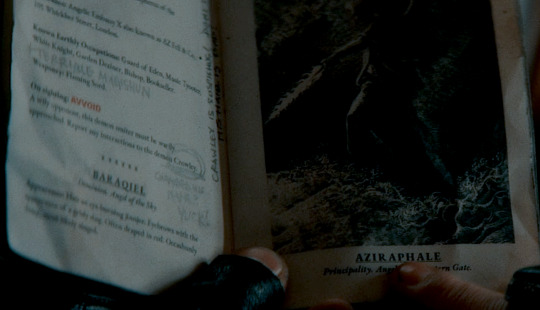
Unfortunately, the very text is quite unreadable. One thing, other than the name, which is pretty clear is the subheading "Angel of the Sky" and since the episode 1 lets us take a look at how Crowley did indeed take part in creation of what is to be seen in the night sky, one can hardly find that entirely non-fitting. One other sentence I was (at least I think) able to read is "Often draped in red."
(On a different note but certainly worth noticing are scribbles that generally just roast Crowley – his suspiciousness, hair and name (though I am not absolutely sure of the latter) "His hair is bad!" Wow, Furfur really does hate Crowley.)
Then there is something written above the name of Baraqiel, unfortunately in none of the picture frames does it get a bit readable. I wonder though, couldn't it be "former"? Since it comes precisely after mention of Crowley to whom should one report on Aziraphale.
Crowley is very powerful. Dominion
A word that is not exactly readable but can be deduced from its placement (it is situated just as Aziraphale's "Principality") is Baraqiel's rank – Dominion Angel. It should be noted here that I very much lack proper knowledge of either Jewish or Christian mythology and I would hate to provide any incorrect claims. I therefore think it is better for me not to overly state things, even more so since everyone can look into it on their own and figure out what that might mean for our beloved demon. What I will say, however, is that they are (as I understand it) very powerful and, placed within the 2nd triad in the angel hierarchy, ranked higher than the Archangels. This would go well along with the emphasis that was in my opinion laid on Crowley's powers quite a lot this season.
For example: "A miracle of enormous power happened last night. The kind of miracle only the mightiest of archangels could've performed," said Shax to Crowley, to which he replied: "How'd you know I didn't do it?" He didn't get an answer.
What I think (and I may be very wrong, obviously) is that a miracle of this vastness wouldn't have happened simply because of a regular angel and a regular demon did together half a miracle each. What is also worth noticing is that the tool with which Crowley created the Nebula is the same as the one he used to temporarily stop time at the end of season 1 right before Satan's arrival. So much to the size of his powers.
Baraqiel, lightning of God. Fallen angel
Finally, to Baraqiel himself. My lack of knowledge concerning this matter still stands and frankly I don't even know where to find valid information about angels and such on the internet. Baraqiel should, however, stand for "lightning of God" and is also regarded as the angel of lightning. In season 2 there are (as far as I remember) two occasions where Crowley is put in correlation with lightning. (1) His poor anger management issues in episode 1 and (2) his not at all better matchmaking in episode 3 ("I haven't done weather in ages"). Furthermore, Baraqiel is considered to be the one who taught astrology to people. Nevertheless, what points to Crowley and Baraqiel being one even more is that Baraqiel is indeed a fallen angel.
•
So... That is probably it. I usually tent to theorize about stuff in quiet, in fact, this is the first time I've used Tumblr for anything other than reading Neil Gaiman's posts. I didn't even think that I would actually post it but then I've searched on Twitter, TikTok and here on Tumblr if anyone else has already come up with this theory. The only post I could find (hopefully I haven't missed anything) was by @valaza_04 on Twitter (click here) where they refer to the same frame shot as I do here.
Now I know, we are still recovering from heartbreaking (but if you ask me, absolutely amazing) finale and the main thing currently on our minds is figuring out why would Aziraphale choose as he did and the many wonderful theories that come with it. However, considering the utterly virulent look that Metatron shot at Crowley before walking out of the bookshop with Aziraphale and also his "Well, [Crowley] always did want to go his own way. Always asking damn fool questions, too." makes me think that he absolutely does not care for Crowley and whichever angel he was before the Fall. And I reckon it won't remain unnoticed in season 3 and might even be really important (or that is just me wishing for more pre-fall Crowley scenes). Hence I decided that I will post this. And it doesn't matter if no one will see this in the end, it was quite fun to write. However, if there is someone who will read this all the way through, I hope they will accept my apology for the mistakes I have most possibly made (English is not my first language) and also for the ridiculous length this post has come to gather. It turns out, I am just as chatty of a writer as I am speaker.
Well maybe I will come around to write one more post about this theory, only with a proper research this time. Till then thank you and, please, support this season by streaming as much as you can so we can have season 3 of this masterpiece of a show. And be kind to those bringing it to us in your comments regarding the ending, even though it is very frustrating and heart-shattering, it is also maybe the best ending we could have hoped for with the prospects of season 3.
Thank you for letting me talk my heart out, Tumblr.
#good omens#good omens season 2#good omens spoilers#go2#go s2#crowley#pre fall crowley#crowley's angel name#good omens 2#david tennant#neil gaiman#aziraphale#good omens theory#baraqiel
449 notes
·
View notes
Text
Bookshelf in Good Omens 2. What clues to look for and what to pay attention to when reading each book.
And don't show this to Neil! And don't ask him about it!
Carefully! There may be spoilers here.


1. I Capture the Castle by Dodie Smith.
The main character sits alone and writes a diary. There is also a very interesting love polygon in the book. At the very end of the book there is an interesting moment about the girl’s father, who writes his book in an interesting way.
For me, this was the answer to why Good Omens 2 was made the way it was: incomprehensible, confusing and with a lot of questions after viewing.
2. No Woman No Cry: My Life with Bob Marley by Rita Marley.
This is Maggie and Nina's book.

Look for the donkey, as well as the story of Rita's shooting. Notice what Rita says when she remembers Bob (he's dead, but he's everywhere).
3. The Crow Road by Iain Banks.
Not only discussions about God are important, but also the meaning of the expression “the crow road.” Notice the angelic goats dressed as ravens in the intro. Remember the story of Job, remember those little goats who followed the crow's path. Try to tie it all together.

And also pay attention to the meaning of matches. What do they mean for the story in the book and could they mean the same for our story?
Crowley recommends this book to Muriel not only because it contains a lot of discussions about God. He knows how important the matchbox is in the story, and he wants Muriel to know it too. Muriel must know that matches are the key to solving the mystery. At the very end of the second season, the story is just beginning to develop. The matchbox doesn't appear in the plot yet, but it will happen in the future, and Muriel must know in advance what it means. I think so.
4. The Curious Incident of the Dog in the Night-Time by Mark Haddon.
A very interesting main character, with a very interesting perception of the world around him. I think this is a hint on how to watch Good Omens 2. The second season needs to be watched the way this boy looks at the world around him. He also has interesting thoughts, some of which may be important to our story.
5. Catch-22 by Joseph Heller.
I have identified five characters. One of them is a naked man (note the reason for his undressing), the second character experiences déjà vu and has strange relationships with colleagues, the third character will do anything for profit (even if he has to bomb his own), the fourth character is compared to God (note , what ultimately happens to him), and the fifth is not entirely noticeable, but wears fake glasses and a mustache. Find them all and analyze what happens to them and why, what their goals are and what consequences their actions have. Think about how this all fits into our story and who these five characters are like.
6. Love in the Time of Cholera by Gabriel García Márquez.
Besides the wonderful love triangle, there are almonds to be found here. This is a small clue to the meaning of almond coffee. The character is a photographer with his secret love - I think this is also a small key to unraveling the mystery of Good Omens 2.
7. The Bell Jar by Sylvia Plath.
There are matches here too, find them. Try to analyze the thoughts of the main character. I still couldn't decide who this book belonged to: Aziraphale, Crowley or Muriel. I'm leaning towards Muriel. Although Neil said that Muriel may not be Muriel in season three. So Aziraphale or Crowley could become Muriel in the future. I still think it's Aziraphale.
The main character of this book underwent shock therapy, and this smoothly leads us to the next book.
8. 1984 by George Orwell.
If you still doubt that history is being rewritten within history, do not doubt it. This book is direct proof. I would also suggest that the shock therapy in the book is an analogue to the erasing of memory and reformatting of consciousness in our history. Then that would explain what I said earlier about Muriel. This book confirms all my previous theories and reasoning. Who, for what purpose and how many times rewrites history - we will find out in season 3.
9. The Big Sleep by Raymond Chandler.
This book contains another clue to the mystery of almond coffee. The book also features a dead bookstore owner who photographed the character's real killer, who was illegally transporting alcohol. There is a little quote about how everything was planned in advance, and this quote is said during the kiss.
10. In this post I talked about the Bible: here.
But I forgot to mention Aaron's rod. This is another key to almond coffee. Read the story of how flowers grew from Aaron's rod and what it means.

11. The Great Gatsby by Francis Scott Fitzgerald.
Gatsby was a liquor smuggler, he loved a blonde and in the end he got shot because of her, don't forget that. This all dates back to 1941. So who's shooting who?
12. The Catcher in the Rye by J. D. Salinger.
To be honest, I have a hard time understanding why this book is on the shelf. The book could be there because of a guy who has a dead red-haired brother (yes, Crowley's brother or twin could very well be real). The book may be there because of the story of catching children over an abyss (the story of Job). The book may be there because of the description of the film, in which a guy loses his memory after a war (after the apocalypse, someone has to survive).
13. A Series of Unfortunate Events by Lemony Snicket.
I recommend reading this series of books and also watching the series. I think the books and the show together will help you understand who Sadie is in Good Omens 2.

Also look for snakes, zombies, anything related to crows, secret codes used by characters (Prime uses them too). Look for smart thoughts, there are many of them. Look for librarians, read about the secret society. We ourselves are a small secret society: we collect information bit by bit, analyze it and share it with each other. Everyone notices something different and everyone is right in their own way. There are many clues in both the books and the show. Feel free to draw parallels. There are even moments that are filmed very similarly in both series.
14. Herzog by Saul Bellow.
A difficult book. Lots of talk about God and faith. I relate this book to the character who will survive the whole apocalypse mess in season 3. Read it for yourself, maybe you will have other thoughts.
15. A Tale of Two Cities by Charles Dickens.
This book needs to be read from cover to cover. The whole story with the revolution and the French guillotine. Think about who those same revolutionaries in our history could be.

All moments with similarities between the two main characters, and also pay attention to the spy. Remember that Jane Austen is a spy. I still assume Jane Austen is Shax. In episode 4, Shax becomes Crowley; Before the stunt, Shax becomes like Aziraphale. Thus, in the dressing room there is a spy and two characters similar to each other (you can read about this here). There is a scene at the end of the book that may shed some light on what is really going on in the dressing room.
In the book you can also find a rose on the hat. Think about this character and the reason he put a rose on his hat.

Find this sign “👆” and its meaning in the book.

Find a seamstress in a book who walks hand in hand with someone very similar to the main character.

This book is on many posters in the hands of Aziraphale for a reason.
16. Lord Jim by Joseph Conrad.
Just read Lord Jim's story and apply it to our Jim.
17. Treasure Island by Robert Louis Stevenson.
Jim is also in this book. And this Jim stole a treasure map from a bad pirate. We can only guess what Jim brought to the bookstore in our story: a “map of buried treasure,” a book of life, the power of God. What other options?
18. Pride and Prejudice by Jane Austen.
Yes, there is a very interesting love story and more than one. A parallel can be drawn with both couples from the book. Jane Austen herself also plays an important role throughout the second season.
Read books, look for clues, superimpose season 2 on these books. This is the wonderful world of Good Omens - an incredible work and an amazing journey!
#aziraphale#crowley#good omens#good omens 2#neil gaiman#azicrow#good omens spoilers#good omens discussion#good omens theories#good omens analysis#good omens meta#good omens aziraphale#good omens crowley#neil gaiman good omens#good omens 2 meta#ineffable divorce#ineffable husbands#good omens fandom#good omens fan theory#good omens clues
134 notes
·
View notes
Text
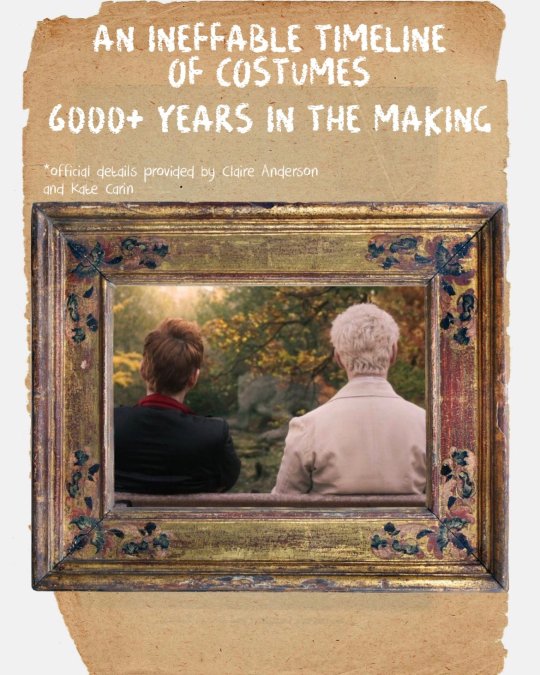

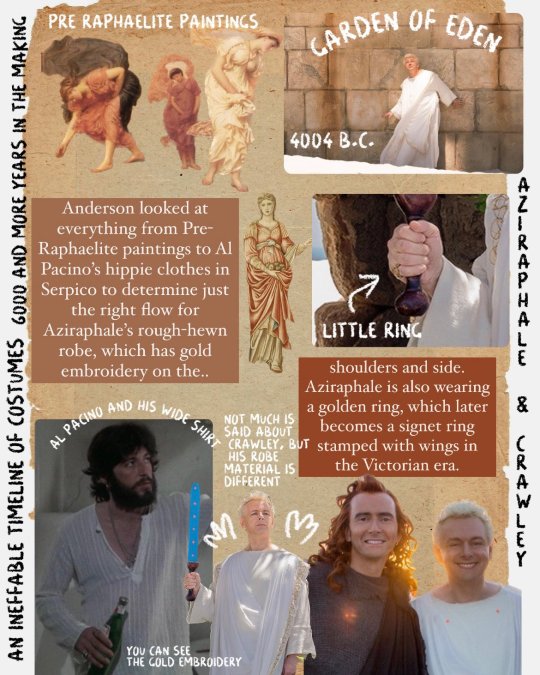

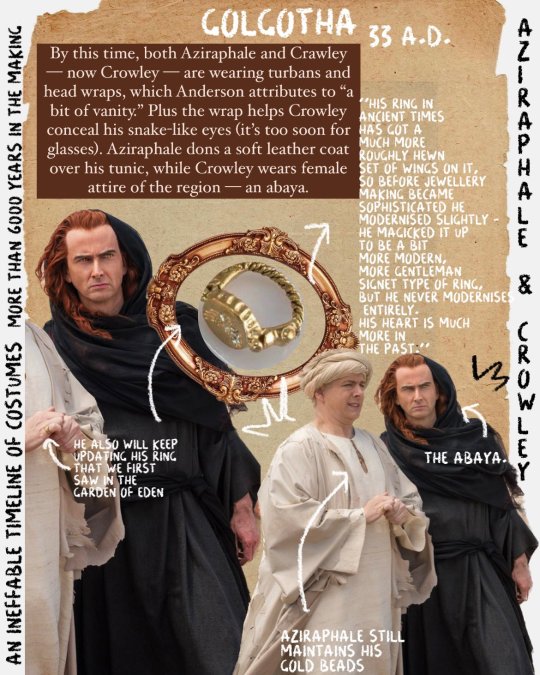
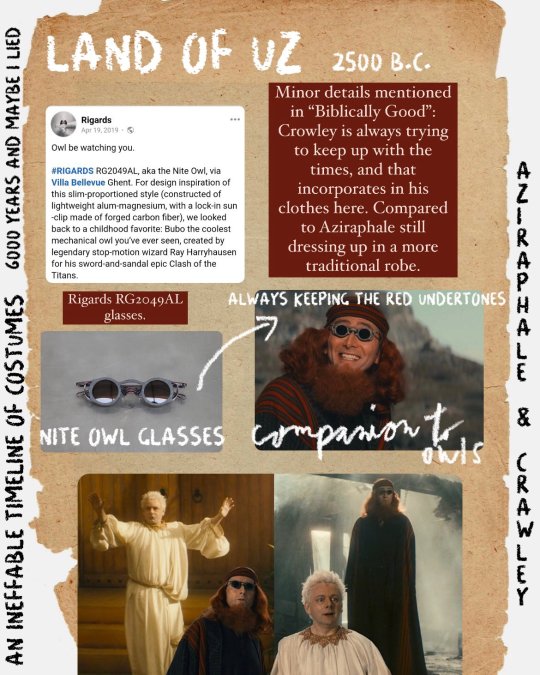
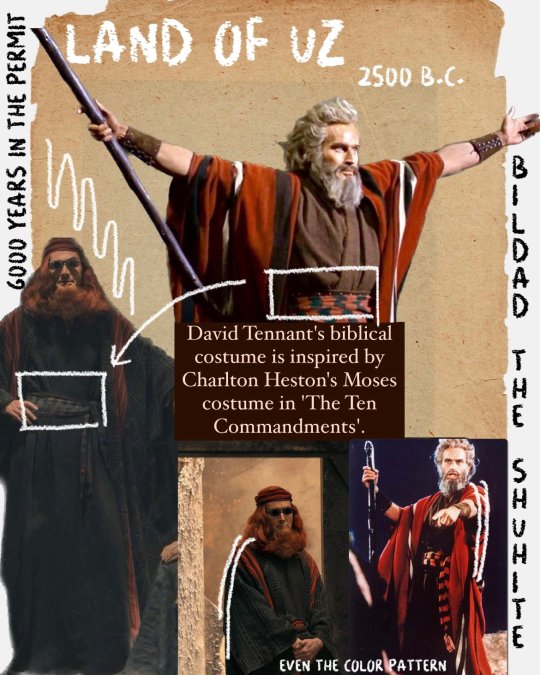

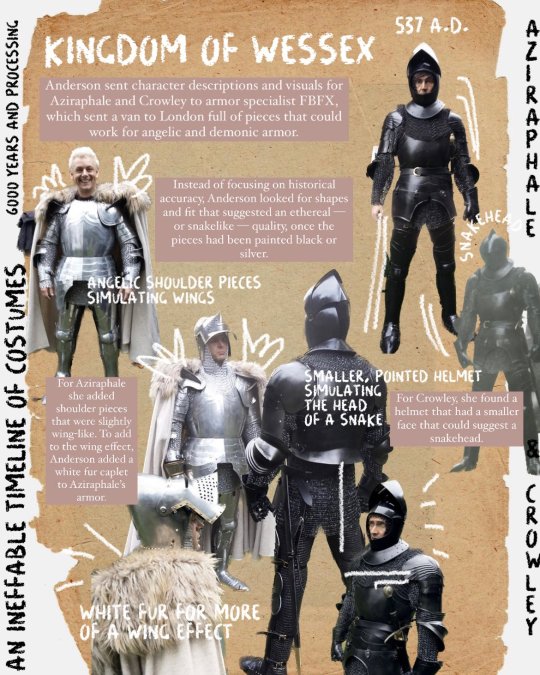



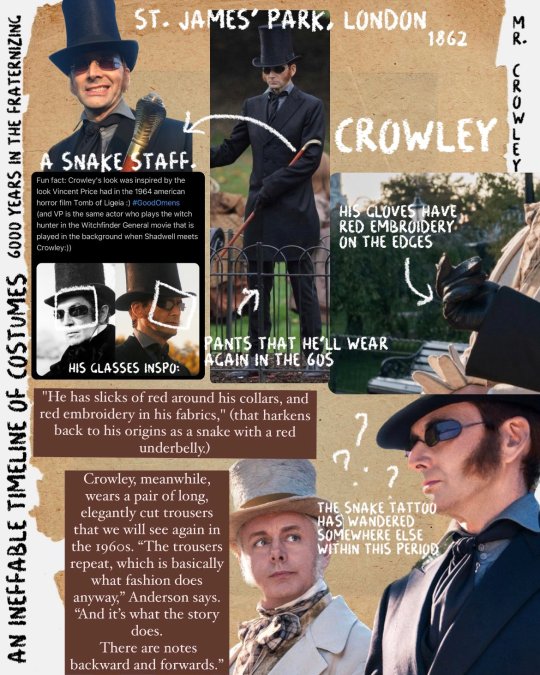

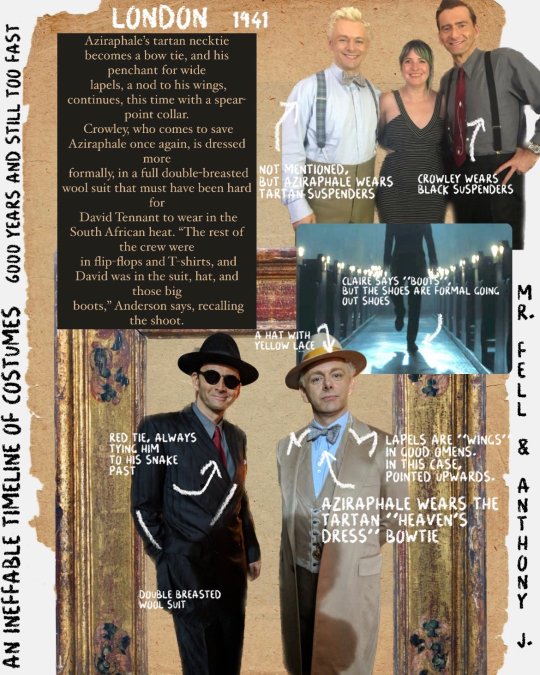

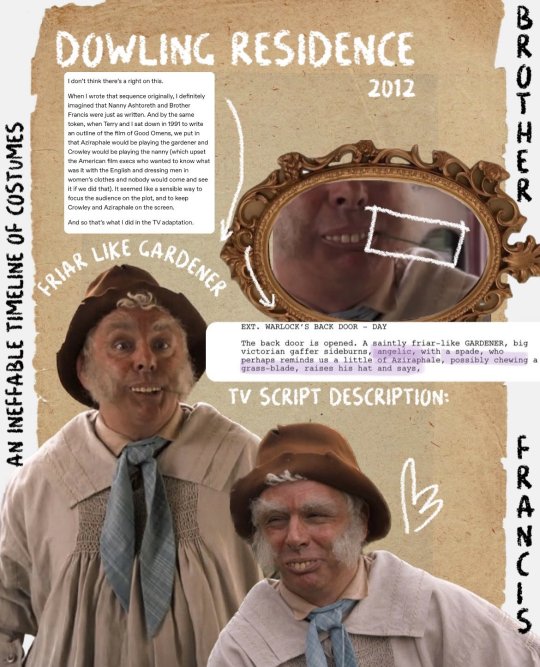
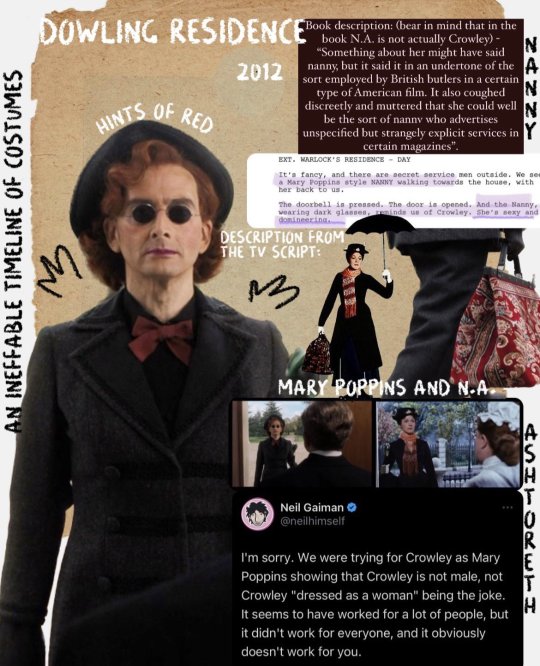

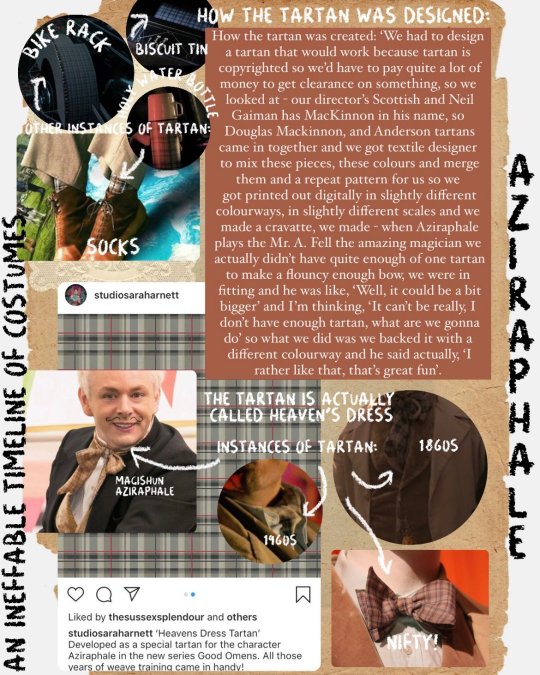


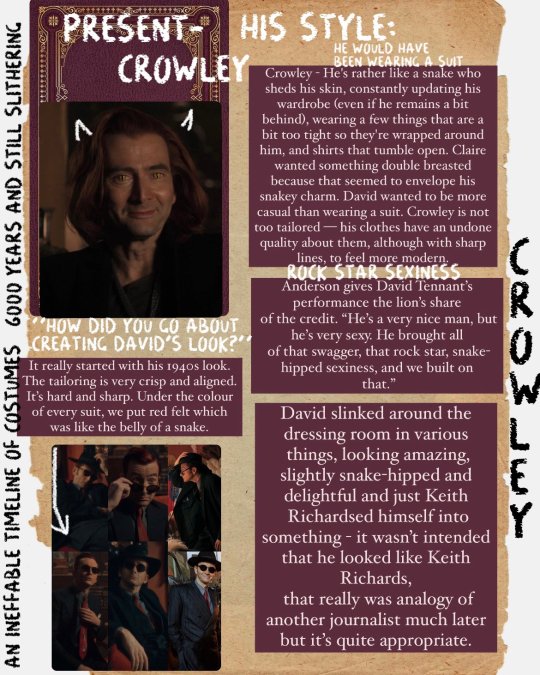
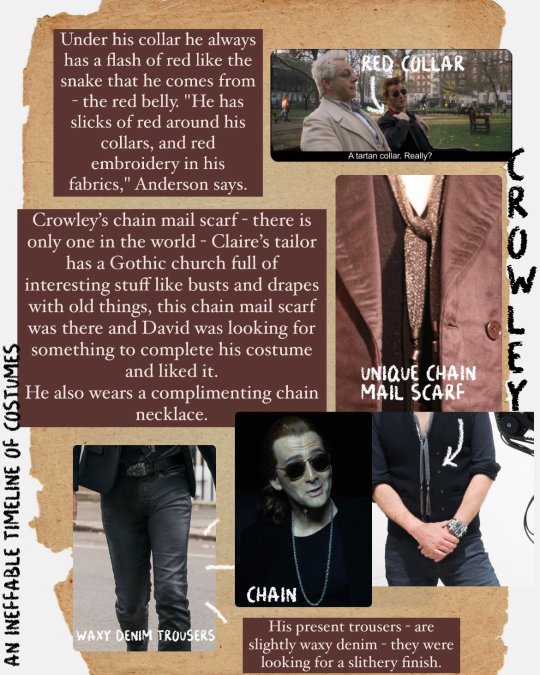
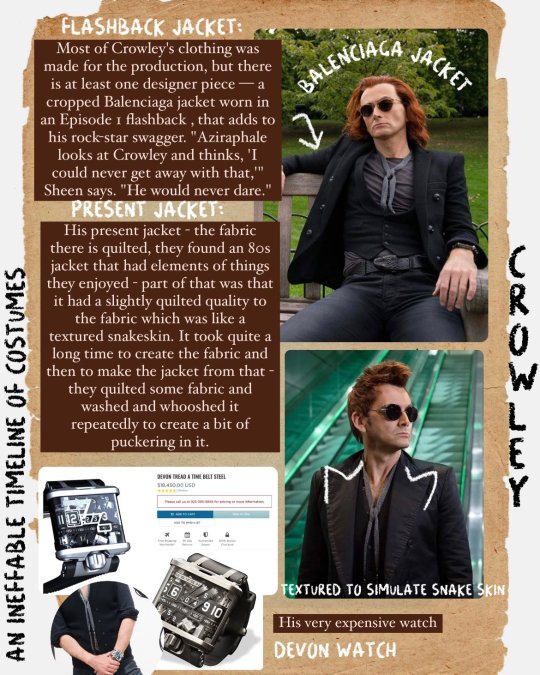

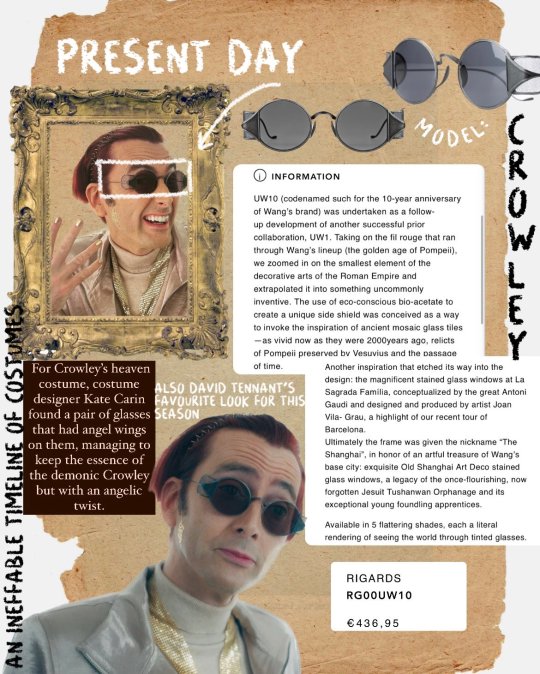

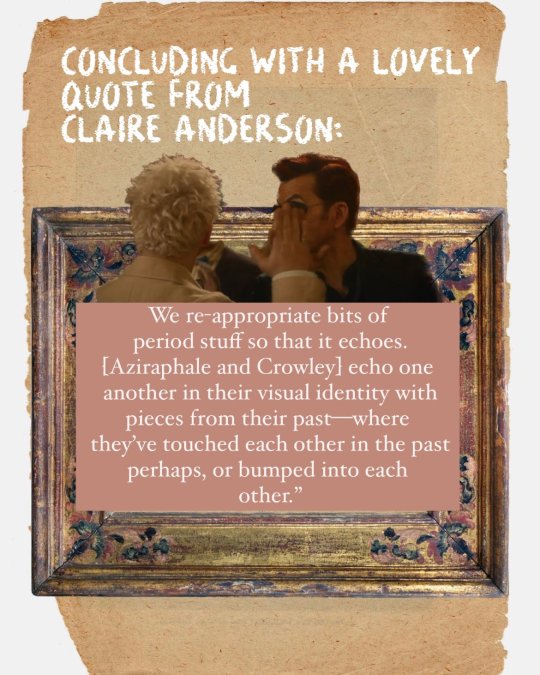
An Ineffable Timeline of costumes:
I had done this previously in separate posts, but I did want to keep the timeline in order (the mess was bugging my brain). Well mostly in order, I had to switch up Golgotha and Land of Uz so that they could fit better.
So, hello again! (or for the first time). I gathered every official source detailing the costumes for s1 and s2. From interviews with Claire Anderson, lead costume designer for season 1 to Kate Carin, lead for season 2.
Some things of course I was not able to put here because there was nothing official confirming or describing the costume choices.
Some extra bits:
Something I did not add here from the X-ray section of GO2, was that Kate Carin mentioned that Aziraphale’s detective look in episode 3 was a sort of “Noir Detective”. But not much else was said about how it came to be, except for the obvious raincoat and hat and case he is carrying. She also talked about rhinestones being glued to Aziraphale’s magician cape in his act in 1941. But that is a fairly noticeable detail as well (I believe) so I did not add it here.
Some very important things to keep in mind:
Nanny Ashtoreth in the book is never directly alluded to be Crowley. There have been debates about this, and that is why I included in the slide of “Brother Francis” the reply Neil gave addressing exactly that. For the TV show, it was decided that both Nanny/ Brother Francis were going to be Crowley and Aziraphale (radio omens too). For the book, well you can read it/ see by yourself that even though one nanny showed up, it is never said to be Crowley.
I had read some tags previously saying “this is not accurate” “this is not this” etc. so just a gentle reminder that the costume department is not here to make things 100000% accurate. Claire Anderson and Kate Carin both had the creative freedom to craft attires and make them believable for the time period. I collected all the sources (below) if you want to read them yourself. This is about experimenting and giving it credibility without it being down to a T.
Some arrows are not specifically pointing to a specific thing. They are there to guide you find what is in the text.
The Sources:
Ineffable Con
SYFY Claire Anderson
SYFY 2
Claire Anderson Costume Designer
Film School Rejects Claire Anderson
RadioTimes- Hair
YouTube Kate Carin interview
Youtube Wrap Party Podcast
Including the behind the scenes videos from Prime “Biblically Good” and “Grave Danger”.
#good omens#crowley#aziraphale#ineffable husbands#neil gaiman#terry pratchett#good omens fun facts#good omens 2#easter eggs#good omens costumes#claire anderson#kate carin#timeline of costumes#only aziraphale and crowley#i will do one for the other characters
123 notes
·
View notes
Text
Why 90 minutes are not enough
As a hyperfixated fan, I will never believe 90 minutes will do Good Omens 3 justice.
The Second Coming storyline was intended as something of similar complexity to the Armageddon - and that took 5 hour-long episodes to tell. People who claim that many good films only take 90 minutes should consider that those production were always intended to last 90 minutes - that's the way they were plotted. Frankly, I can't think of a single satisfactory book-to-screen adaptation that would fit into this time restriction. Other STP books adaptations (Colour of Magic, Hogfather, Going Postal) are over 3hr long each. Stardust is over 2hr, and has a much simpler plot.
Added to that is the entire Aziracrow storyline that - let's be fair - is the main thing we all want to see done well. I'm afraid I'm not in the "just kiss and fuck off to South Downs" camp. That ending never held much meaning for me, because we all know how it ends. What I cared for was the path there - healing the heartbreak, becoming an "us". A simple apology dance, or "whatever let's just stop the world from ending" won't cut it. They're lovestory has so far been told through the fluffy, casual, seemingly unimportant details. The kiss isn't evidence of their love. It's the "don't go unscrewing the cap", "three tones of voice", "our car/our bookshop", it's the way Aziraphale's hand remains upright when Crowley's almost wraps over it, or how Crowley gives up the whole argument the moment he learns Aziraphale might be in danger. And through the flashbacks and minisodes now almost certainly lost.
And then there's the whole intellectual side of Good Omens. The show is often praised for being a wonderful queer representation, but not enough is said about it being autistic representation. Most ethereal and occult characters on GO are autistic-coded, but contrary to such productions as House MD, Sherlock, or Atypical, the plot doesn't revolve around them being ND. Instead, we, the neurodivergent recognise ourselves in tiny details - when Shax suddenly asks about hot water, when Muriel doesn't realise the Metatron has just offended them. But that isn't all. We, the ND people are drawn to the whole meta side of the show. The tarot card parallels, the mirror structure, the bloody camera filters! We are treated while being represented - this show is about us and for us. Have you read any of the mindblowing metas on tumblr…? Many people say that Good Omens is full of fillers that are easily omitted, but those parts are simply the ones whose significance the less invested audience didn't recognise.
Nothing of that will be left in 90 minutes. It can be a pleasant experience, an entertaining narrative of stopping the end of the world with, hopefully, a few sweet moments stolen away by Aziraphale and Crowley. And that's all. No nuance or riddles to be tracked over the next years, no grandeur of an epic story told with patience and no compromise. No narrative legacy to leave a mark in contemporary storytelling, the way season 1 did. No satisfying return on everything season 2 discreetly hinted (and how ridiculous that what was basically a backdoor prologue to the final arc will now be 3 times longer than the story itself!). And, above all, no carefully planned and slowly delivered healing.
Just. A 1.5h fantasy comedy to consume on a winter evening before moving on when they're gone forever.
28 notes
·
View notes